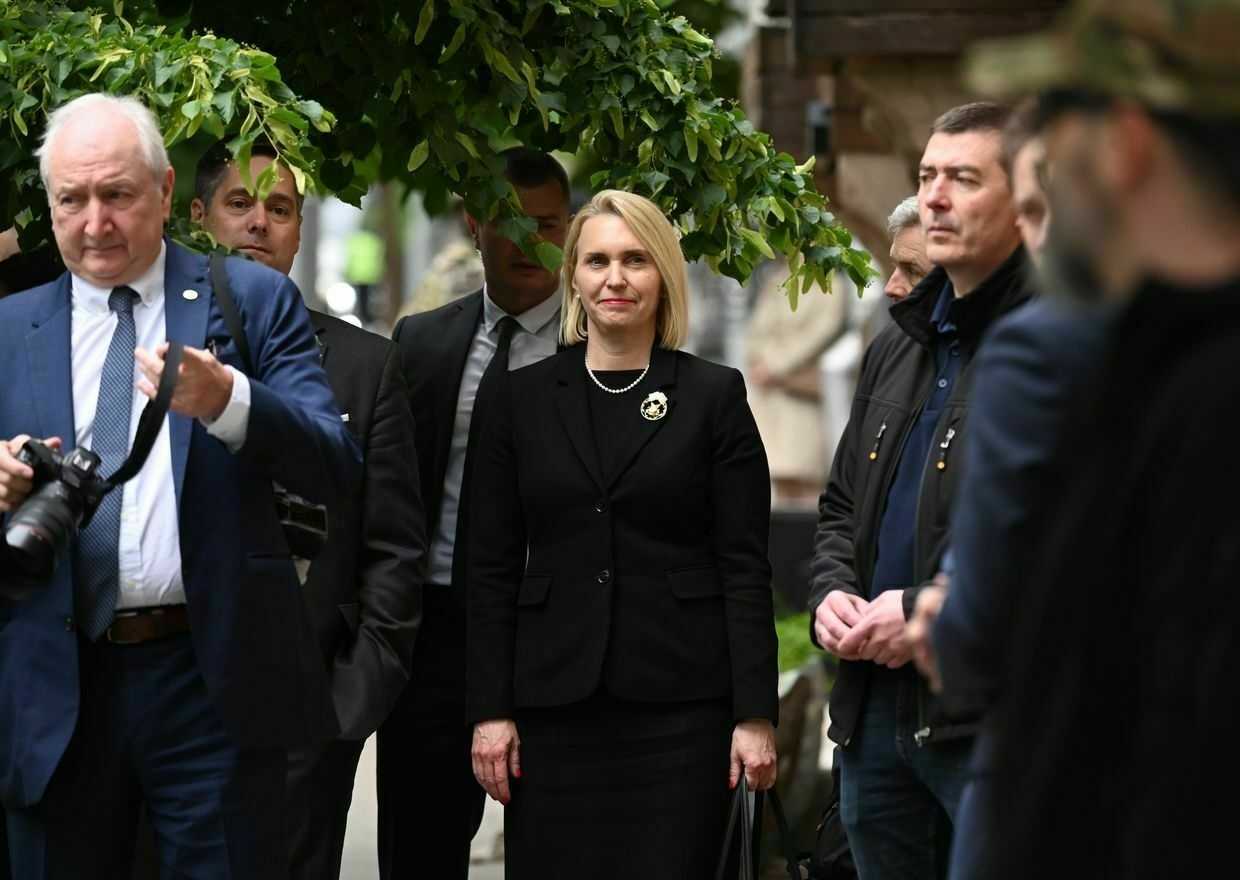-
Ukraine can be split like postwar Germany after peace deal, Kellogg suggests
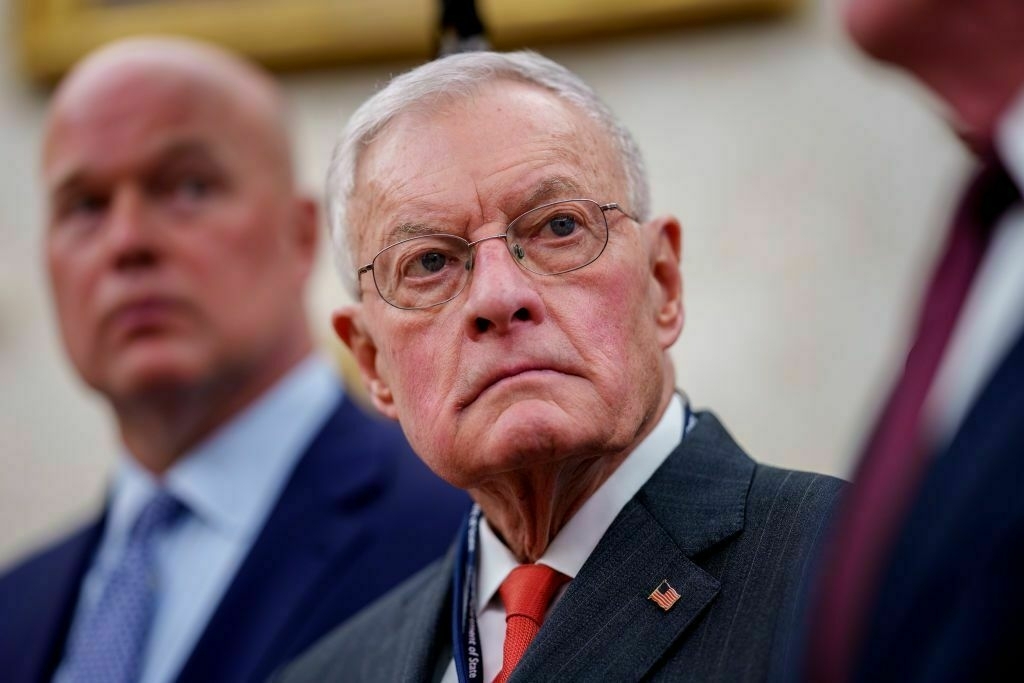
Ukraine could be partitioned into separate zones as part of a peace deal with Russia, U.S. President Donald Trump’s Special Envoy for Ukraine, Keith Kellogg, said in an interview with the Times on April 11.
Kellogg proposed establishing a “reassurance force” led by the U.K. and France in western Ukraine and concentrating Ukrainian troops east of the Dnipro river, where a demilitarized zone would also be established near the current line of control. Territories currently under occupation would be controlled by Russian forces.
“You could almost make it look like what happened with Berlin after World War Two, when you had a Russian zone, a French zone, and a British zone, a U.S. zone,” he said.
While the Kremlin has repeatedly rejected the idea of European troops monitoring a ceasefire in Ukraine, Kellogg said that a U.K.- and French-led force in western Ukraine “would not be provocative at all” to Russia.
“You’re west of the (Dnipro), which is a major obstacle,” he said.
Kellogg also proposed creating an 18-mile demilitarized zone in eastern Ukraine along the current front line to act as a buffer between Russian and Western troops.
“You look at a map and you create, for lack of a better term, a demilitarized zone [DMZ]. Take both sides back up 15 kilometers each, that’s 18 miles,” he said.
“And you have a … DMZ that you can monitor, and you’ve got this … no-fire zone. You can monitor that pretty easily."
Russia may still not accept the proposal, Kellogg acknowledged. He also said he expected the ceasefire conditions to be violated.
“Now, are there going to be violations? Probably, because there always are. But your ability to monitor that is easy,” he said.
The U.S. would not be committing any ground troops to the reassurance force in Ukraine, Kellogg said. He also warned France and the U.K. not to count on U.S. support for the “coalition of the willing,” an alliance of European and Commonwealth countries who have pledged to provide security guarantees to Ukraine after a ceasefire.
“Always plan for the worst case,” he said, adding that the coalition’s reassurance force would still be able to send an effective message to Russian President Vladimir Putin.
did not clarify whether he believes Ukraine should cede additional territory east of the Dnipro to Russia.
Kellogg’s comments mark the first time a senior U.S. official has proposed the Dnipro as a line of demarcation in postwar Ukraine. The proposal comes the same day that Trump’s Special Envoy to the Middle East, Steve Witkoff, met with Putin in St. Petersburg to discuss a future peace settlement in Ukraine.
Witkoff and Kellogg are reportedly at odds in their approach to a peace deal in Ukraine, according to two unnamed U.S. officials and five other undisclosed sources who spoke to Reuters for a story published April 11.
Witkoff has reportedly told Trump that giving Russia “ownership” of four occupied Ukrainian regions would be the fastest way to achieve a ceasefire, while Kellogg has argued that Ukraine would never agree to unilaterally cede total ownership of the territories to Moscow.
Kellogg’s plan to partition Ukraine, however, would involve leaving the illegally occupied regions under Russian control. President Volodymyr Zelensky has maintained that Kyiv will never recognize these territories as legally Russian.
The comparisons to postwar Berlin may also be offensive to Ukraine, which has a functioning democratic government, unlike Nazi Germany in 1945. Russia has also used false allegations of “Nazism” in Ukraine to justify its full-scale invasion.
Trump urges Russia ‘to get moving’ to end war against Ukraine“Russia has to get moving. Too many people are dying, thousands a week, in a terrible and senseless war — a war that should have never happened, and wouldn’t have happened, if I were president,” U.S. President Donald Trump said.The Kyiv IndependentKateryna Denisova
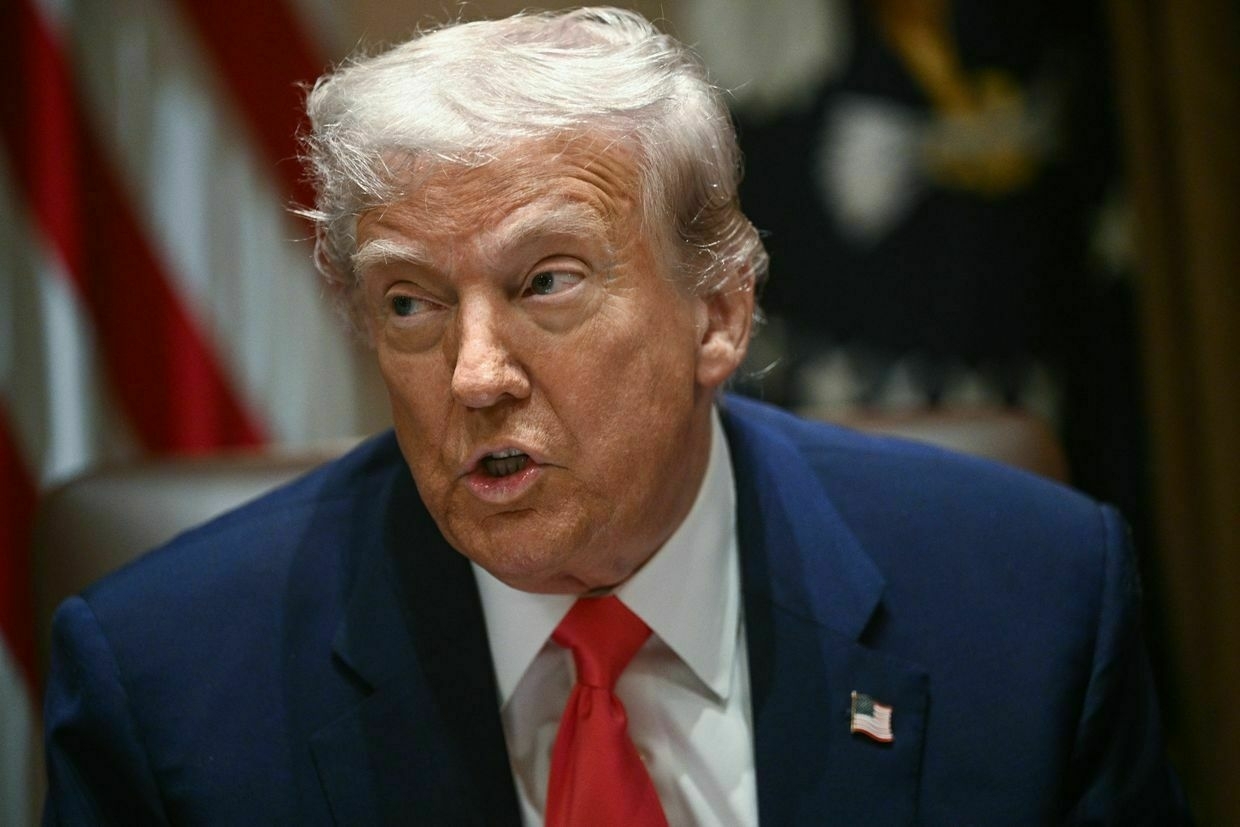
-
Russia's Economy Crashes, Medics Under Fire, and Trump Slams New Missile Strikes | News Pulse
-
Putin, Witkoff discuss 'aspects of Ukrainian settlement,' Kremlin says
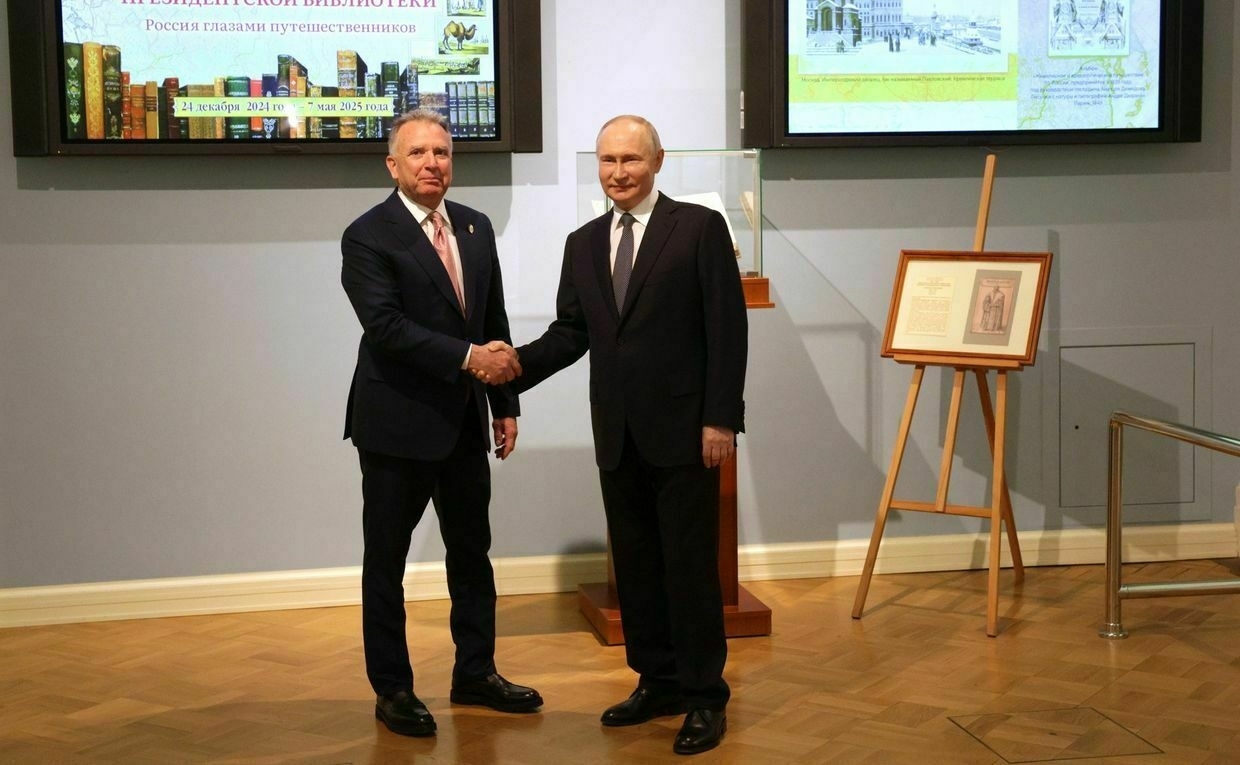
Editor’s Note: This is a developing story.
U.S. Special Envoy Steve Witkoff and Russian President Vladimir Putin concluded their talks, which focused on the “Ukrainian settlement,” the Kremlin said on April 11.
The talks, held in St. Petersburg, mark Witkoff’s third in-person meeting with Putin.
“The topic of the meeting was aspects of the Ukrainian settlement,” the Kremlin said in a statement published after the talks. No further details were provided as to the content of the discussions.
Russian envoy Kirill Dmitriev, who was present at the meeting between Putin and Witkoff, called the talks “productive.” Dmitriev also held a separate meeting with Witkoff earlier in the day.
Witkoff has now left Russia, according to flight tracking data.
The April 11 meeting follows a second round of diplomatic talks between U.S. and Russian officials in Istanbul. The talks focused on embassy operations and the war in Ukraine was reportedly not discussed.
Witkoff’s latest meeting with Putin comes as Moscow continues to reject U.S. President Donald Trump’s calls for a complete ceasefire between Russia and Ukraine. Russia has not only refused a full ceasefire, but has also continued to barrage Ukrainian cities with attacks and repeatedly violated the partial truce established in mid-March.
Witkoff has told Trump that giving Russia “ownership” of four illegally occupied Ukrainian regions would be the fastest way to achieve a ceasefire, Reuters reported on April 11, citing two unnamed U.S. officials and five other undisclosed sources.
According to Reuters, Witkoff conveyed this proposal to Trump after meeting with Dmitriev in early April.
Witkoff has courted controversy by parroting Russian propaganda regarding the illegal occupation of Ukraine’s Donetsk, Luhansk, Zaporishzhia, and Kherson oblasts.
Ukraine war latest: US envoy Witkoff proposes giving Russia ‘ownership’ of Ukrainian regions, Reuters reportsKey developments on April 11: * US envoy Witkoff proposes giving Russia ‘ownership’ of Ukrainian regions, Reuters reports * Trump urges Russia “to get moving” to end war against Ukraine * Putin meets U.S. envoy Witkoff to discuss Ukraine, Kremlin says * “Several hundred” Chinese nationals fight…The Kyiv IndependentThe Kyiv Independent news desk
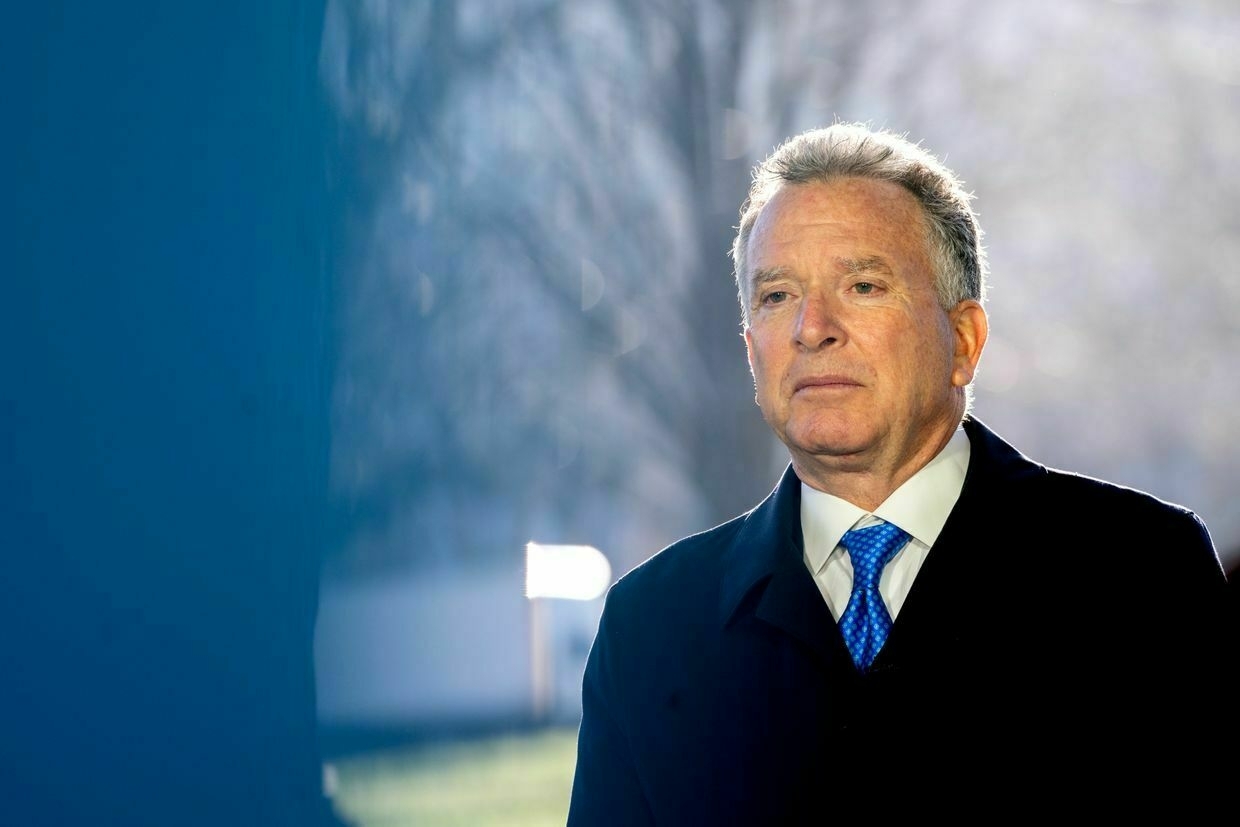
-
Ukraine ready to buy more air defense systems, Zelensky says
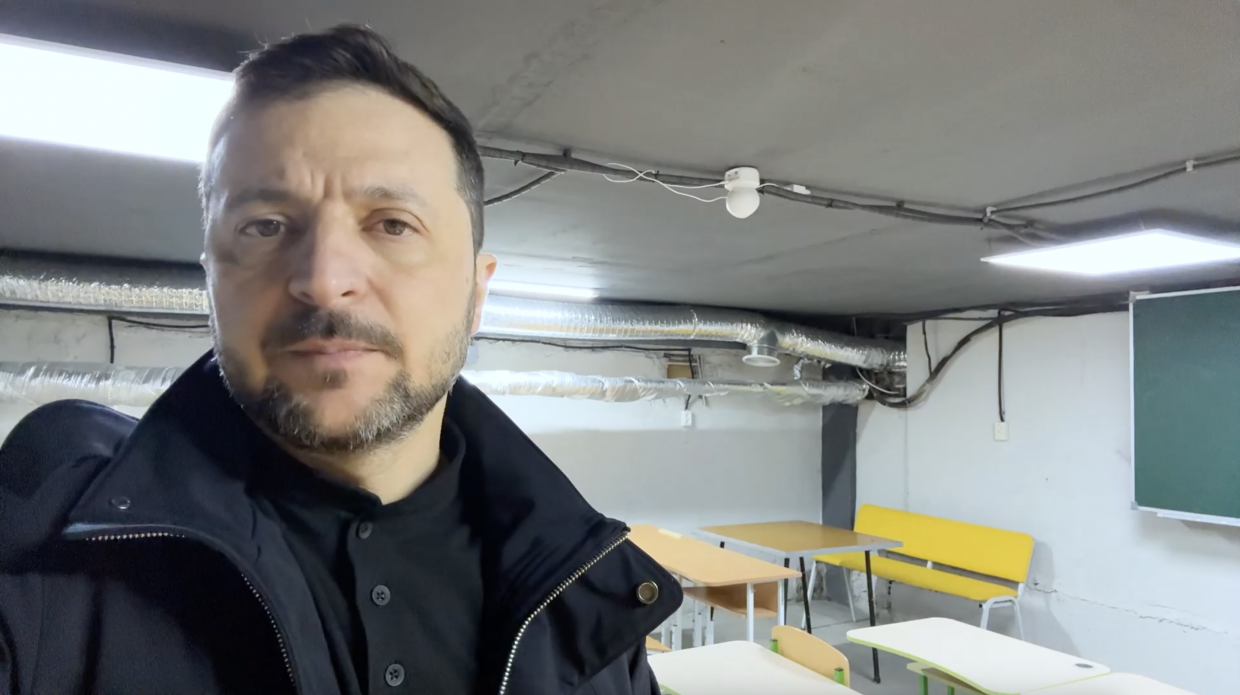
Kyiv is prepared to purchase additional air defense systems to better protect Ukrainian cities from Russian attacks, President Volodymyr Zelensky said during his evening address on April 11.
The need for more air defenses was the focus of his address to the participants in the Ramstein-format summit held earlier in the day in Brussels, Zelensky said, calling it “the first priority.”
The president participated in the summit virtually, joining the meeting from Kryvyi Rih — Zelensky’s hometown and the site of a deadly Russian missile attack last week that killed 20 people, including nine children.
“The main thing for us is air defense, additional air defense systems, missiles for them,” Zelensky said, delivering his address while sheltering underground in a local school where three of the victims studied.
“To protect people’s lives, to protect our cities. We are very much counting on the decisions of our partners – we need systems, they exist in the world, and we need a political decision so that air defense works, works here … and many other of our cities and our communities."
Zelensky also said he discussed the matter with U.S. President Donald Trump.
“Ukraine is not just asking – we are ready to buy the appropriate additional systems,” he said.
Shortly after the April 8 missile attack on Kryvyi Rih, Zelensky urged the U.S. to provide more Patriot air defense systems to Ukraine. The highly advanced U.S. Patriot systems have played a crucial role in protecting Ukraine’s sky. They are capable of downing even the most advanced ballistic missiles, such as Kinzhals.
During a March 19 call with Zelensky, Trump agreed to assist Ukraine in finding additional Patriot systems available in Europe.
While Kyiv and Moscow agreed to a U.S.-brokered partial ceasefire on March 11, Russian attacks against Ukrainian cities did not abate in the month that followed. Russia launched 70 missiles, 2,200 Shahed-type drones, and 6,000 guided aerial bombs over the past 30 days, Foreign Minister Andrii Sybiha said on April 11.
Ukraine has already agreed to accept a complete ceasefire on all hostilities as soon as Russia abides by the same terms. Russia continues to refuse.
Ukraine war latest: US envoy Witkoff proposes giving Russia ‘ownership’ of Ukrainian regions, Reuters reportsKey developments on April 11: * US envoy Witkoff proposes giving Russia ‘ownership’ of Ukrainian regions, Reuters reports * Trump urges Russia “to get moving” to end war against Ukraine * Putin meets U.S. envoy Witkoff to discuss Ukraine, Kremlin says * “Several hundred” Chinese nationals fight…The Kyiv IndependentThe Kyiv Independent news desk
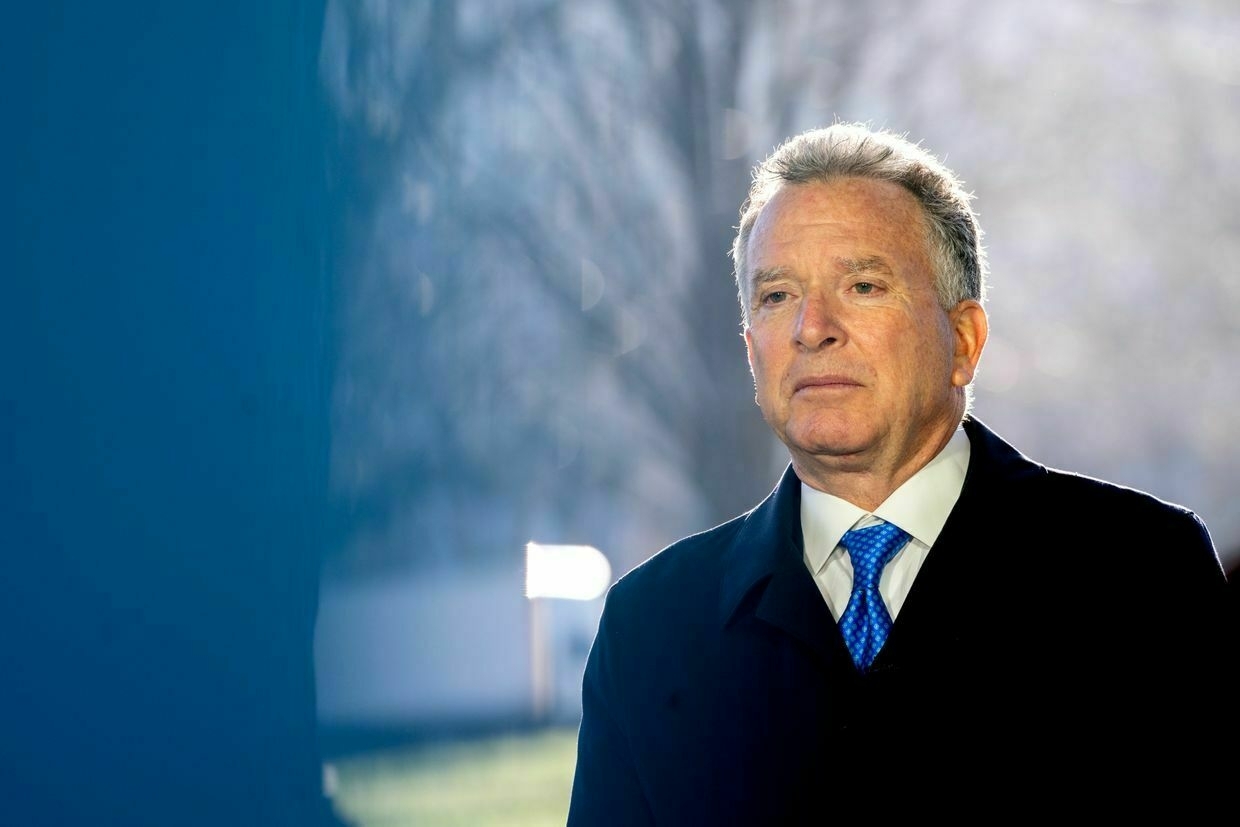
-
Ukraine war latest: US envoy Witkoff proposes giving Russia 'ownership' of Ukrainian regions, Reuters reports
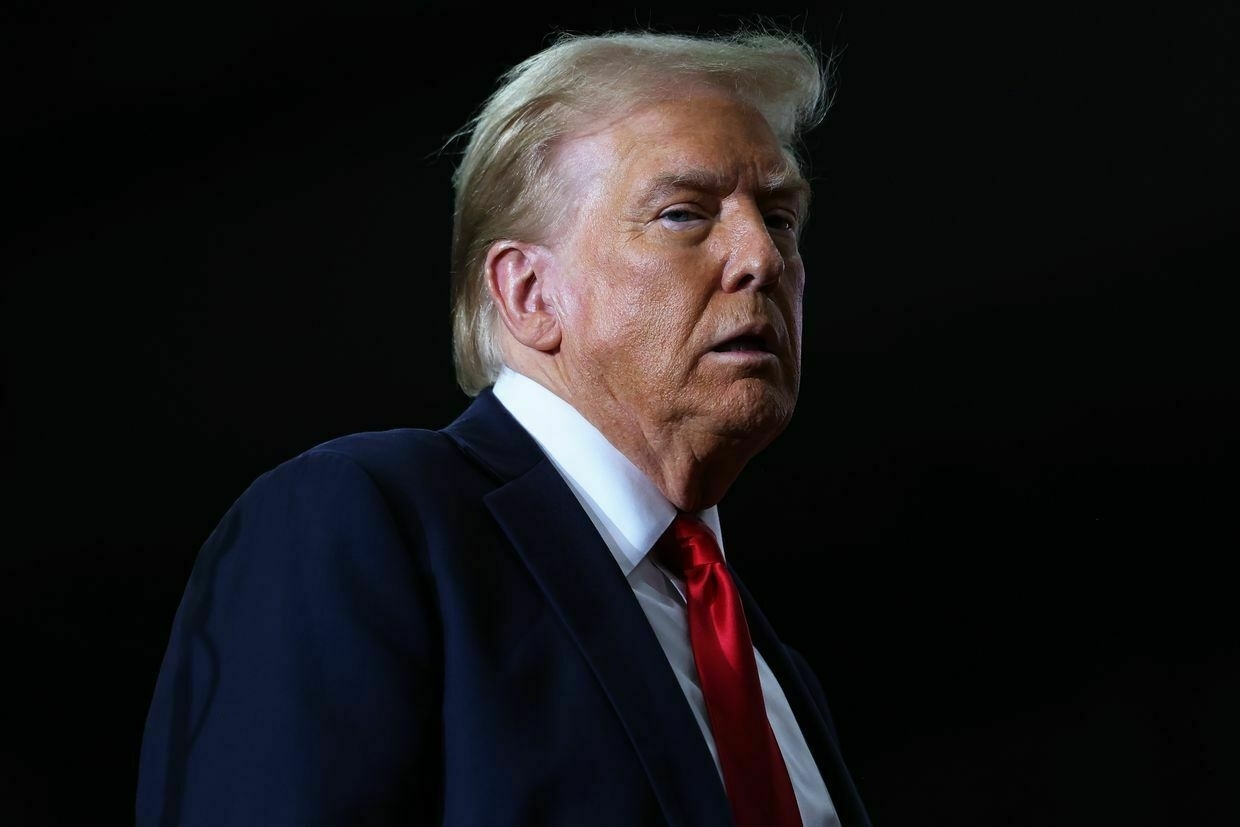
Key developments on April 11:
- US envoy Witkoff proposes giving Russia ‘ownership’ of Ukrainian regions, Reuters reports
- Trump urges Russia “to get moving” to end war against Ukraine
- Putin meets U.S. envoy Witkoff to discuss Ukraine, Kremlin says
- “Several hundred” Chinese nationals fighting for Russia, Zelensky says
- Allies pledge “record” $23.8 billion to Ukraine at Ramstein summit as U.K. warns 2025 will be “critical”
- Russia has fired 70 missiles, 2,200 drones at Ukraine since March 11 ceasefire proposal, Kyiv says
U.S. Special Envoy Steve Witkoff has told President Donald Trump that giving Moscow “ownership” of four occupied Ukrainian regions would be the fastest way to achieve a ceasefire, Reuters reported on April 11, citing two unnamed U.S. officials and five other undisclosed sources.
According to Reuters, Witkoff conveyed this proposal to U.S. President Donald Trump after meeting with Russian envoy Kirill Dmitriev in Washington in early April.
The news came as Witkoff met Russian President Vladimir Putin in St. Petersburg to discuss a possible path toward a settlement in Ukraine.
According to Reuters’s sources, Trump administration officials are increasingly divided on how to break the deadlock in Russia’s war against Ukraine, with Witkoff and U.S. Special Envoy Keith Kellogg disagreeing on the best course forward.
In a March interview with American far-right political commentator Tucker Carlson, Witkoff openly parroted Russian propaganda regarding Ukraine’s occupied territories.
Witkoff claimed that the majority of people in Ukraine’s Russian-occupied territories had participated in referendums and “indicated that they want to be under Russian rule."
He referred to the Russian sham vote on the annexation of Ukraine’s Luhansk, Donetsk, Zaporizhzhia, and Kherson oblasts held in September 2022.
The hastily organized “referendums” were held at gunpoint in the Russian-controlled parts of the regions, with widespread voter intimidation and soldiers going door to door with ballot boxes.
The so-called “referendums” contradicted international, Ukrainian and even Russian law and were recognized only by two countries — Russia and North Korea, both of which have little knowledge of free elections.
Moscow illegally declared the annexation of Crimea in 2014, as well as the partially occupied Donetsk, Luhansk, Zaporizhzhia, and Kherson oblasts eight years later.
The Trump administration has already signaled it expects Kyiv to make territorial concessions as part of a possible peace deal, calling a return to Ukraine’s pre-2014 borders “unrealistic."
Trump urges Russia ‘to get moving’ to end war against UkraineU.S. President Donald Trump wrote on the Truth Social platform on April 11 that Russia “has to get moving” to end its war against Ukraine.
“Russia has to get moving. Too many people are dying, thousands a week, in a terrible and senseless war — a war that should have never happened, and wouldn’t have happened, if I were president,” Trump said.
Despite repeated threats, the Trump administration has not yet imposed any major sanctions on Russia. At the same time, the White House previously paused all military and intelligence assistance to Ukraine in March, pressuring Kyiv to agree to a mineral resource deal.
Trump’s post preceded a meeting between his special envoy Steve Witkoff and Russian President Vladimir Putin in St. Petersburg to discuss a potential path toward a settlement in Ukraine.
The statement also came a month after Ukraine agreed to a U.S. proposal for a full 30-day ceasefire during talks in Jeddah on March 11, provided Russia abides by the conditions. Moscow has rejected the deal unless it includes conditions undermining Ukraine’s defenses, namely a full halt on foreign military aid.
Trump may impose new Russia sanctions if ceasefire not reached by end of April, Axios reportsThe warning follows Ukraine’s agreement to a full 30-day ceasefire on March 11 during U.S.-mediated talks in Saudi Arabia.The Kyiv IndependentTim Zadorozhnyy
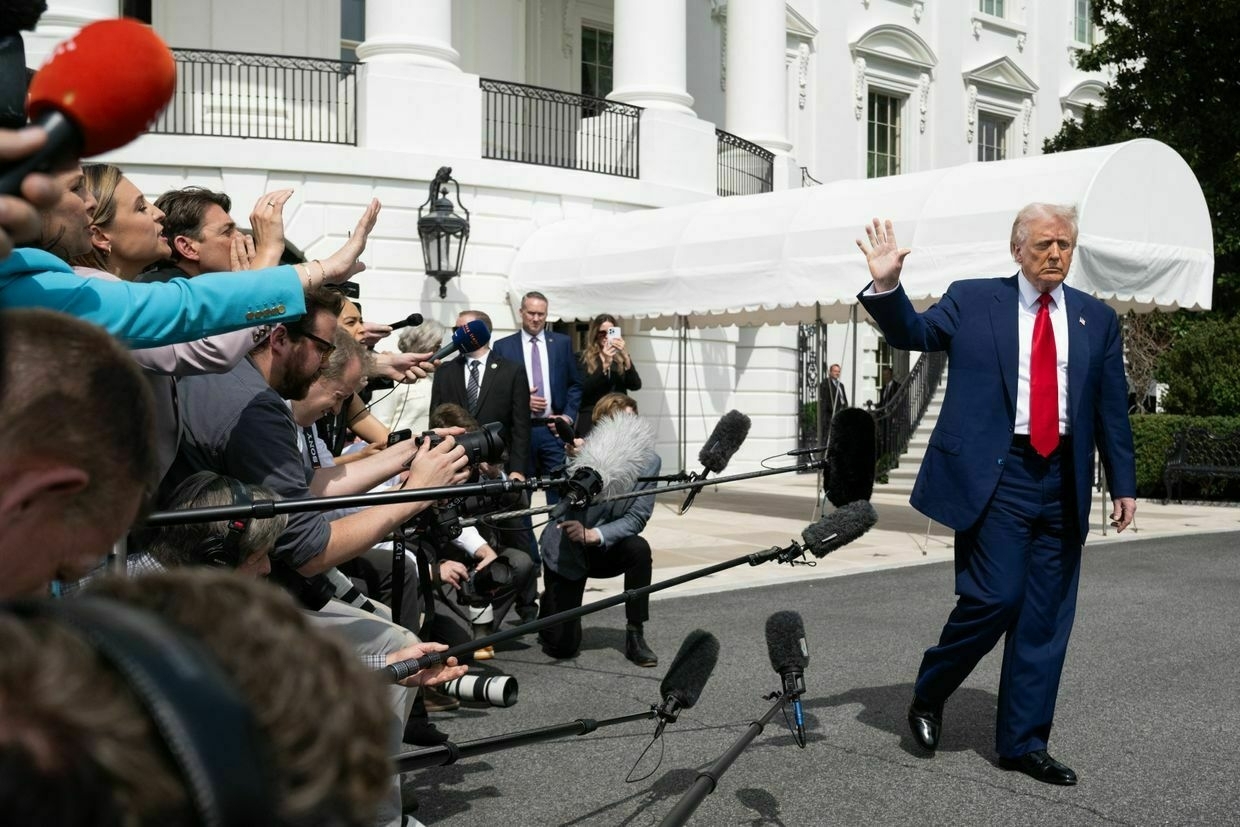
Putin meets U.S. envoy Witkoff to discuss Ukraine, Kremlin saysRussian President Vladimir Putin and U.S. President Donald Trump’s special envoy Steve Witkoff met on April 11 to discuss a possible path toward a settlement in Ukraine, the Kremlin said.
The Kremlin published a video showing a handshake between Witkoff and Putin.
Witkoff, who has led Trump’s effort to broker a ceasefire between Moscow and Kyiv, had previously arrived in Russia for his third meeting with the Russian leader.
Kremlin spokesperson Dmitry Peskov tempered expectations of the upcoming talks, calling them a continuation of diplomatic efforts that is unlikely to bring a major breakthrough.
A possible meeting between Trump and Putin could be on the agenda, Peskov said.
Hockey celebrates Ovechkin, but Putin is the real winnerAlexander Ovechkin has become the greatest goal scorer in National Hockey League (NHL) history — an extraordinary accomplishment that cements his legacy as one of hockey’s most influential figures. For fans around the world, the Washington Capitals’ No. 8 stands as a symbol of perseverance, dedicati…The Kyiv IndependentAdam Sybera
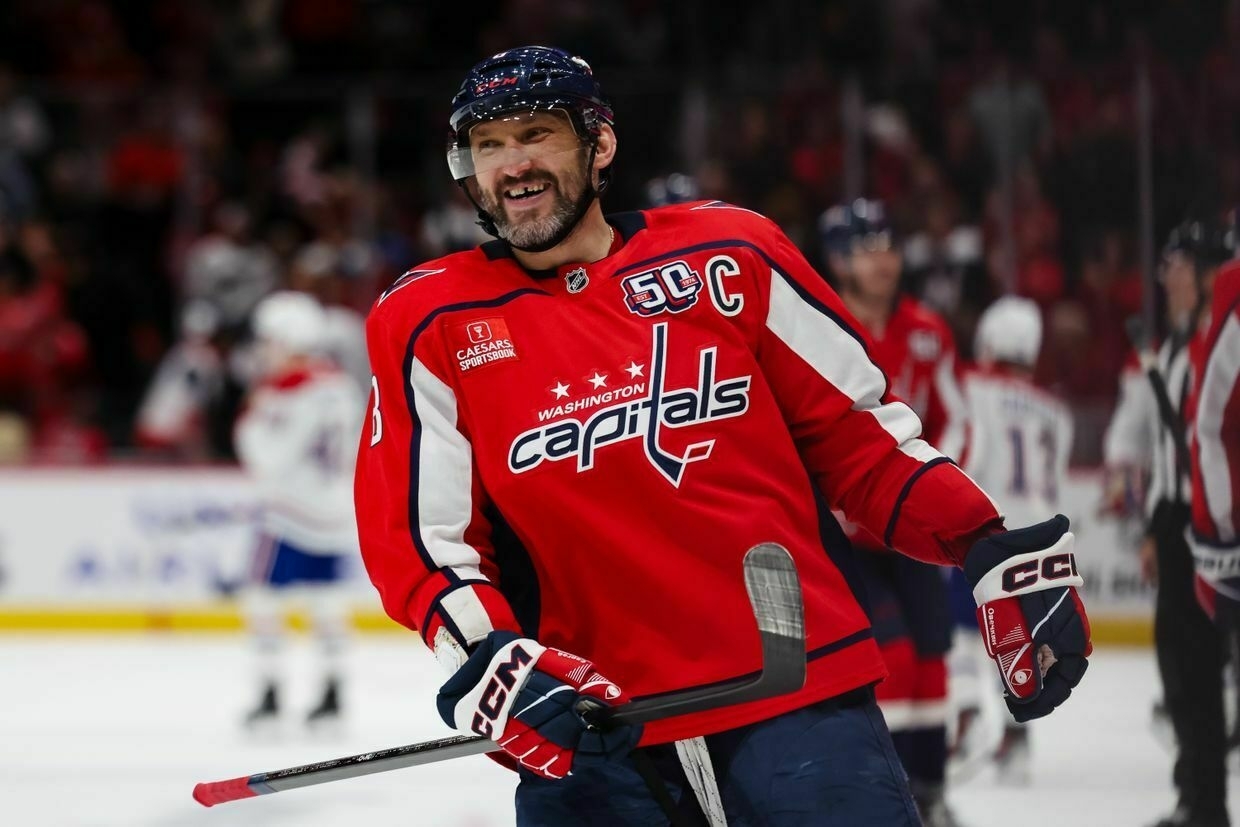
“Several hundred” Chinese nationals fighting for Russia, Zelensky saysAt least “several hundred” Chinese citizens are fighting on Russia’s side in the war against Ukraine, President Volodymyr Zelensky said on April 11.
The alleged number of Chinese nationals joining Russian forces has increased since Zelensky’s previous statement. On April 9, he said that 155 Chinese citizens were fighting for Moscow on Ukrainian territory.
Earlier this week, Kyiv captured two Chinese nationals fighting for Russia in Donetsk Oblast.
“As of now, there is information indicating that at least several hundred Chinese nationals are fighting as part of Russia’s occupation forces. This means Russia is clearly trying to prolong the war even by using Chinese lives,” Zelensky said, addressing Western partners at a Ramstein-format summit in Brussels.
“Putin was not satisfied with soldiers from North Korea. Now he is trying to cover his shortages by pulling in yet another nation — the Chinese,” the president added.
‘Don’t come, there’s nothing good here’ — Chinese soldiers warn against following Russian propaganda to fight in UkraineThe Ukrainian military recently captured two Chinese soldiers fighting for Russia. Kyiv subsequently released data on a total of 163 Chinese nationals identified by Ukrainian intelligence as fighting for Moscow. “We are collecting information, we believe that there are many more,” President Volodym…The Kyiv IndependentKollen Post
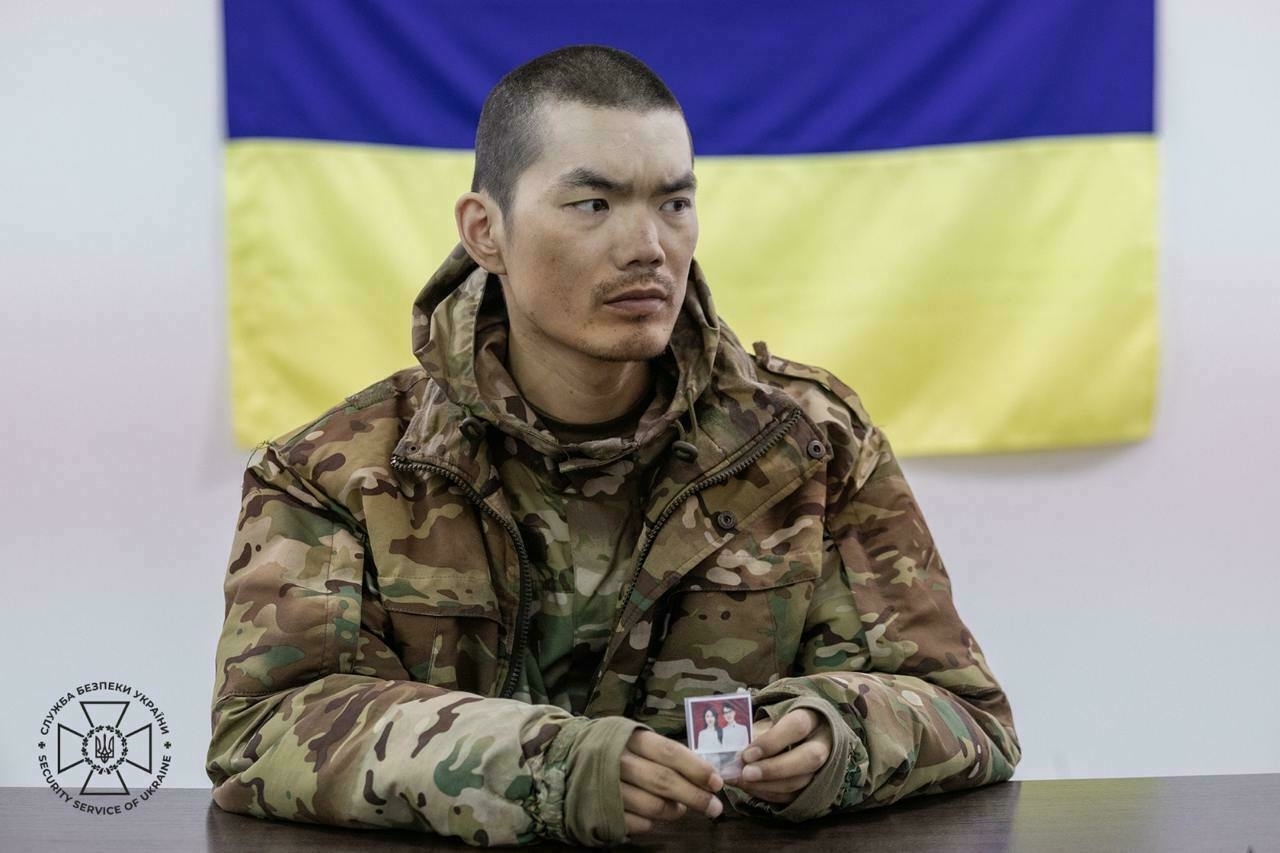
Allies pledge “record” $23.8 billion to Ukraine at Ramstein summit as U.K. warns 2025 will be “critical”NATO allies committed more than 21 billion euros ($23.8 billion) in long-term military aid to Ukraine during the April 11 meeting of the Ukraine Defense Contact Group (UDCG), British Defense Secretary John Healey said.
“This is record support in military aid to Ukraine,” Healey said.
“2025 is the critical year for this war,” Healey said. “Now is the critical moment… for defense industries, militaries and governments to step up."
The defense secretary stressed that the pledges were not only about firepower but about sending a clear message: “We stand with you in the fight and in the peace."
London has allocated 4.5 billion pounds ($5.8 billion) for Ukraine in 2025 — its largest annual contribution to date. The U.K. and Norway earlier pledged an additional 450 million pounds ($585 million) in combined military support.
Germany announced it would send four IRIS-T air defense systems, tanks, armored vehicles, missiles, shells, and more, with the contribution of 11 billion euros (nearly $14.4 billion) through 2029.
The newly unveiled sum shows that “the message was understood very clearly, that the support for Ukraine cannot diminish,” Lithuania’s Defense Minister Dovile Sakaliene told journalists on the sidelines of the summit, according to a Kyiv Independent reporter.
“Lithuania specifically pledged additionally almost 30 million euros ($34 million), and that means that this year, we have already pledged 110 million euros ($125 million), and we will, of course, reach 200 million ($280 million), and probably go higher,” she added.
The Netherlands has also allocated 150 million euros ($170 million) to boost Ukraine’s air defenses, Dutch Defense Minister Ruben Brekelmans announced.
Allies launch electronic warfare coalition to back Ukraine“The coalition is designed not only to meet the current needs of the Ukrainian army in electronic warfare, but also to lay the foundation for the long-term development of these capabilities,” Defense Minister Rustem Umerov said.The Kyiv IndependentKateryna Denisova
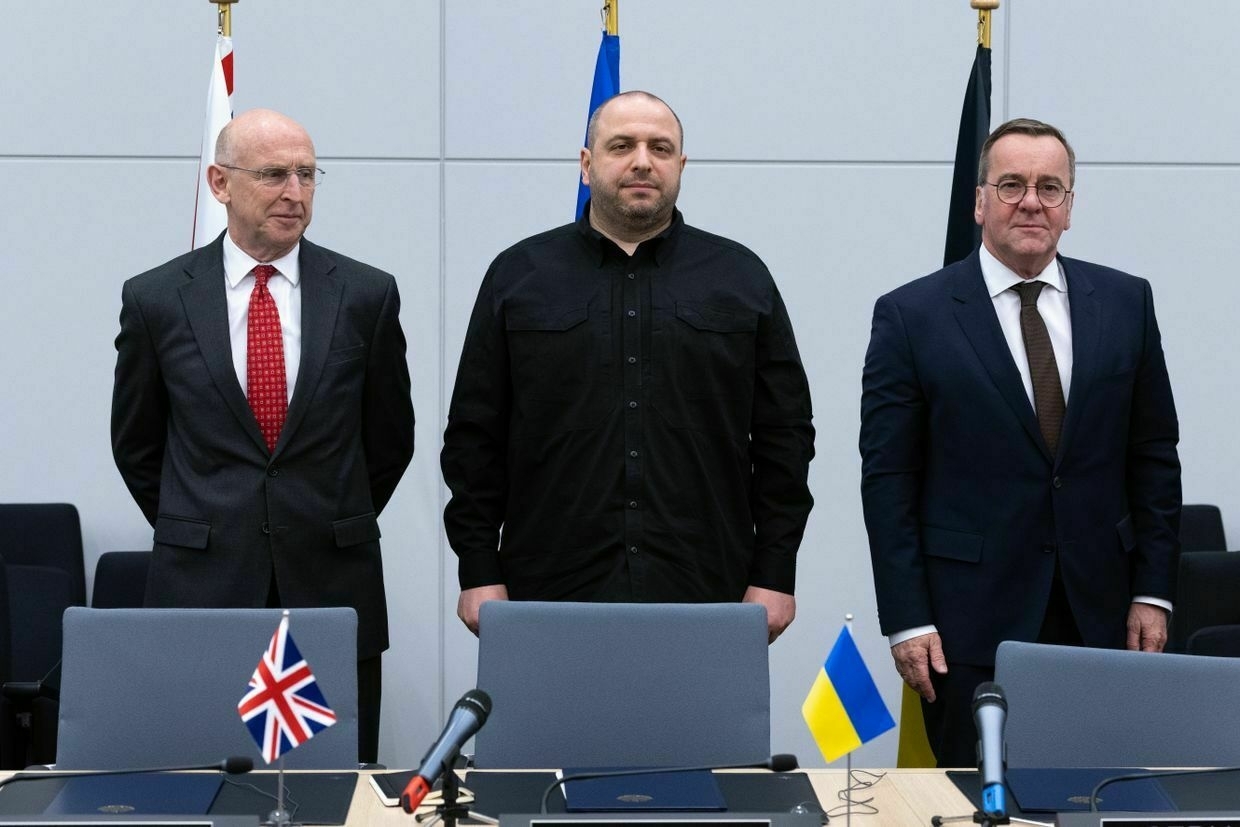
Russia has fired 70 missiles, 2,200 drones at Ukraine since March 11 ceasefire proposal, Kyiv saysRussia has launched 70 missiles, 2,200 Shahed-type drones, and 6,000 guided aerial bombs against Ukraine since Kyiv and Washington agreed on a temporary truce on March 11, Foreign Minister Andrii Sybiha said on April 11.
Ukrainian officials agreed to a U.S. proposal for a full 30-day ceasefire during their talks in Jeddah, provided Russia abides by the conditions. Moscow has rejected the deal unless it includes conditions undermining Ukraine’s defenses, namely a full halt on foreign military aid.
“From March 11 to April 11, Russia shot at Ukraine almost 70 missiles of various types, over 2,200 Shahed drones, and more than 6,000 guided aerial bombs,” Sybiha said on X.
“These were Russian responses to peace proposals. This is typical of Russia: lying, manipulating, and continuing terror."
Note from the author:
Ukraine War Latest is put together by the Kyiv Independent news desk team, who keep you informed 24 hours a day, seven days a week. If you value our work and want to ensure we have the resources to continue, join the Kyiv Independent community.
-
US envoy Witkoff proposes giving Russia 'ownership' of Ukrainian regions, Reuters reports
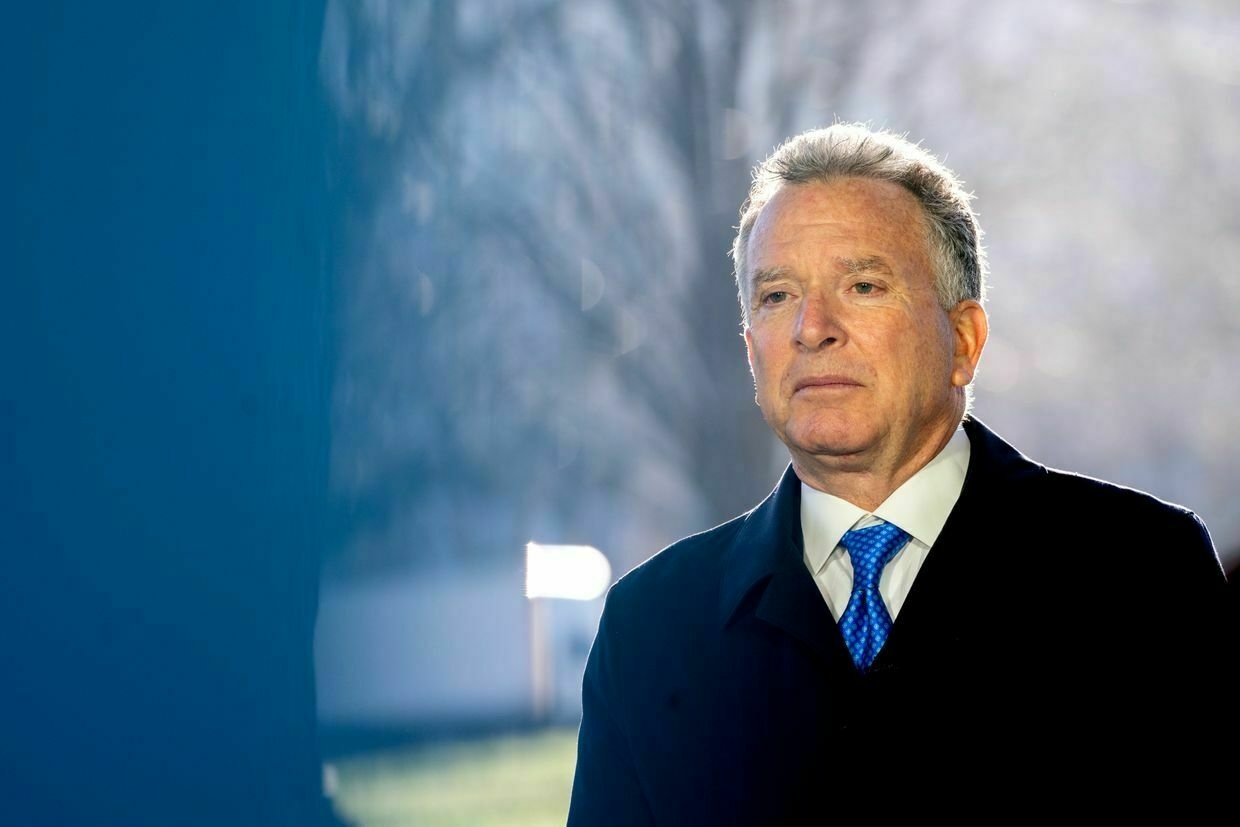
U.S. Special Envoy Steve Witkoff has told President Donald Trump that giving Moscow “ownership” of four occupied Ukrainian regions would be the fastest way to achieve a ceasefire, Reuters reported on April 11, citing two unnamed U.S. officials and five other undisclosed sources.
According to Reuters, Witkoff conveyed this proposal to U.S. President Donald Trump after meeting with Russian envoy Kirill Dmitriev in Washington in early April.
The news came as Witkoff met Russian President Vladimir Putin in St. Petersburg to discuss a possible path toward a settlement in Ukraine.
According to Reuters’s sources, Trump administration officials are increasingly divided on how to break the deadlock in Russia’s war against Ukraine, with Witkoff and U.S. Special Envoy Keith Kellogg disagreeing on the best course forward.
In a March interview with American far-right political commentator Tucker Carlson, Witkoff openly parroted Russian propaganda regarding Ukraine’s occupied territories.
Witkoff claimed that the majority of people in Ukraine’s Russian-occupied territories had participated in referendums and “indicated that they want to be under Russian rule."
He referred to the Russian sham vote on the annexation of Ukraine’s Luhansk, Donetsk, Zaporizhzhia, and Kherson oblasts held in September 2022.
The hastily organized “referendums” were held at gunpoint in the Russian-controlled parts of the regions, with widespread voter intimidation and soldiers going door to door with ballot boxes.
The so-called “referendums” contradicted international, Ukrainian and even Russian law and were recognized only by two countries — Russia and North Korea, both of which have little knowledge of free elections.
Moscow illegally declared the annexation of Crimea in 2014, as well as the partially occupied Donetsk, Luhansk, Zaporizhzhia, and Kherson oblasts eight years later.
The Trump administration has already signaled it expects Kyiv to make territorial concessions as part of a possible peace deal, calling a return to Ukraine’s pre-2014 borders “unrealistic."
Editorial: What Steve Witkoff doesn’t get about Ukraine (and Russia)In any negotiation, one of the most powerful weapons is knowledge. In that regard, Steve Witkoff is willfully disarmed. And it’s playing just right for Russia. The interview that Witkoff, Trump’s special envoy, gave to Tucker Carlson a few days ago revealed a truth that was perceived especiallyThe Kyiv IndependentThe Kyiv Independent
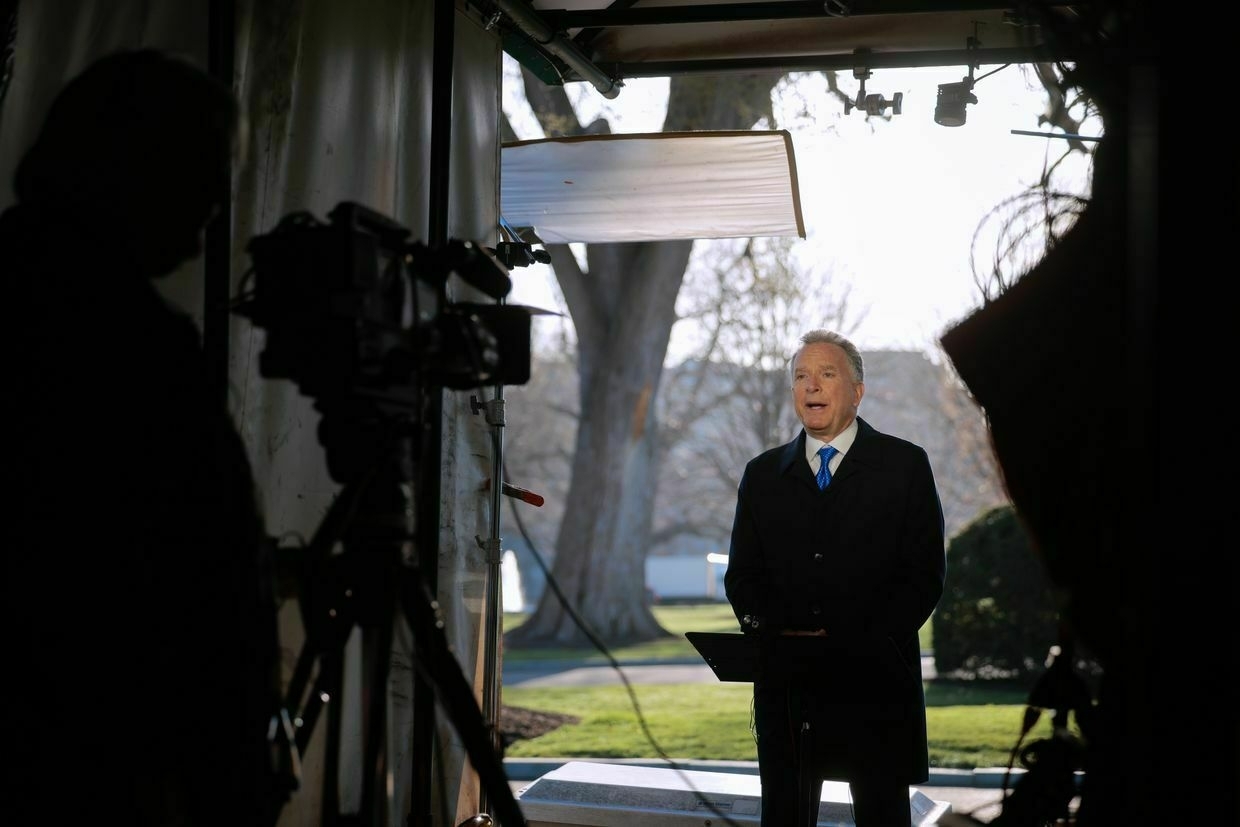
-
Trump urges Russia 'to get moving' to end war against Ukraine
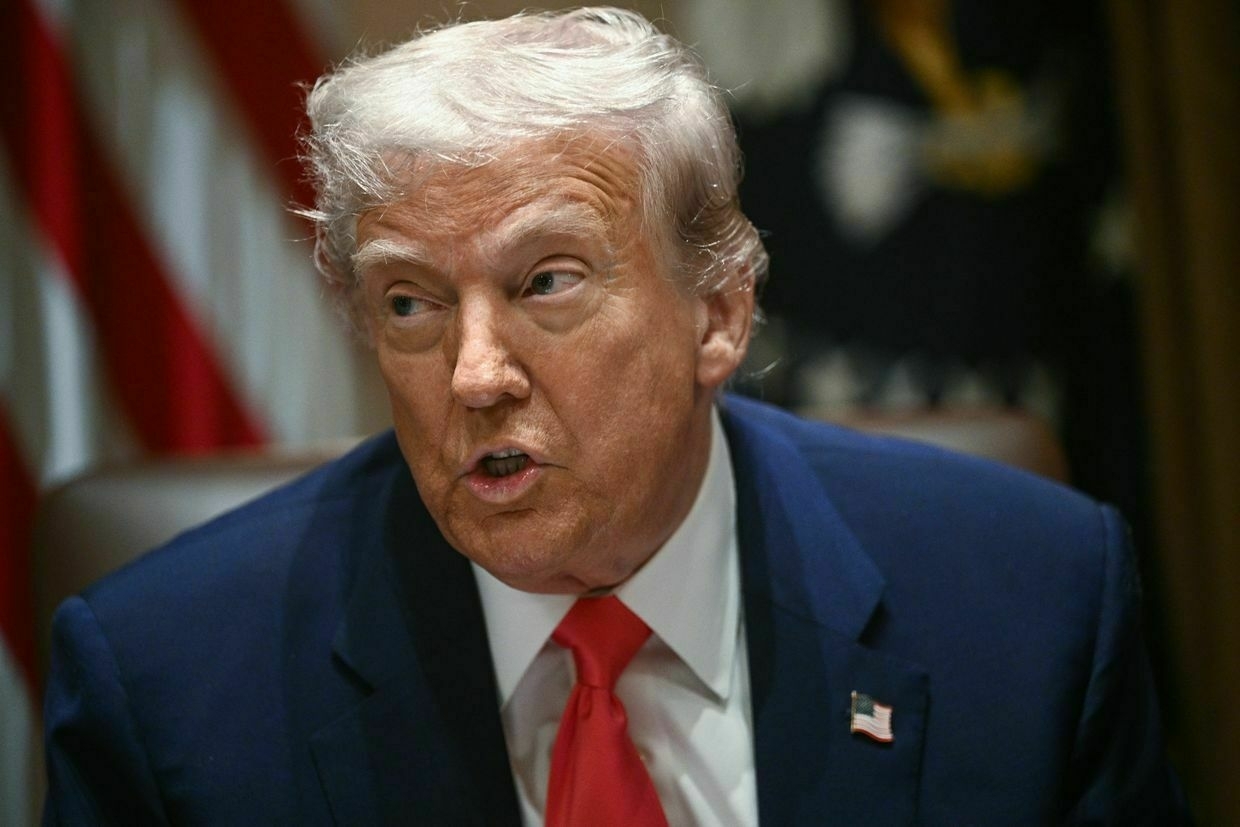
U.S. President Donald Trump wrote on the Truth Social platform on April 11 that Russia “has to get moving” to end its war against Ukraine.
“Russia has to get moving. Too many people are dying, thousands a week, in a terrible and senseless war — a war that should have never happened, and wouldn’t have happened, if I were president,” Trump said.
Despite repeated threats, the Trump administration has not yet imposed any major sanctions on Russia. At the same time, the White House previously paused all military and intelligence assistance to Ukraine in March, pressuring Kyiv to agree to a mineral resource deal.
Trump’s post preceded a meeting between his special envoy Steve Witkoff and Russian President Vladimir Putin in St. Petersburg to discuss a potential path toward a settlement in Ukraine.
The statement also came a month after Ukraine agreed to a U.S. proposal for a full 30-day ceasefire during talks in Jeddah on March 11, provided Russia abides by the conditions. Moscow has rejected the deal unless it includes conditions undermining Ukraine’s defenses, namely a full halt on foreign military aid.
Instead, Ukraine, Russia, and the U.S. agreed on March 25 to halt attacks on energy infrastructure and fighting in the Black Sea.
However, the Kremlin has blocked the partial ceasefire as well, saying that the Black Sea ceasefire would take effect only after some sanctions against Russia are lifted. Russia and Ukraine have also accused each other of violating the ban on energy infrastructure strikes.
Since Kyiv and Washington agreed on a temporary truce, Russia has launched 70 missiles, 2,200 Shahed drones, and 6,000 guided aerial bombs against Ukraine, Foreign Minister Andrii Sybiha said on April 11.
In recent days, the U.S. president has renewed his push for a ceasefire. Axios reported on April 11, citing an undisclosed source, that Trump could impose additional sanctions on Russia if a ceasefire with Ukraine is not reached by the end of April.
As Russia refuses to accept ceasefire, will Trump pressure Moscow?Three weeks ago, Ukraine and the U.S. agreed to implement a full 30-day ceasefire. Russia declined to do so, issuing a list of demands instead. On April 4, Russia hit a residential neighborhood in the city of Kryvyi Rih with ballistic missiles and drones, killing 19 people, including nineThe Kyiv IndependentOleg Sukhov
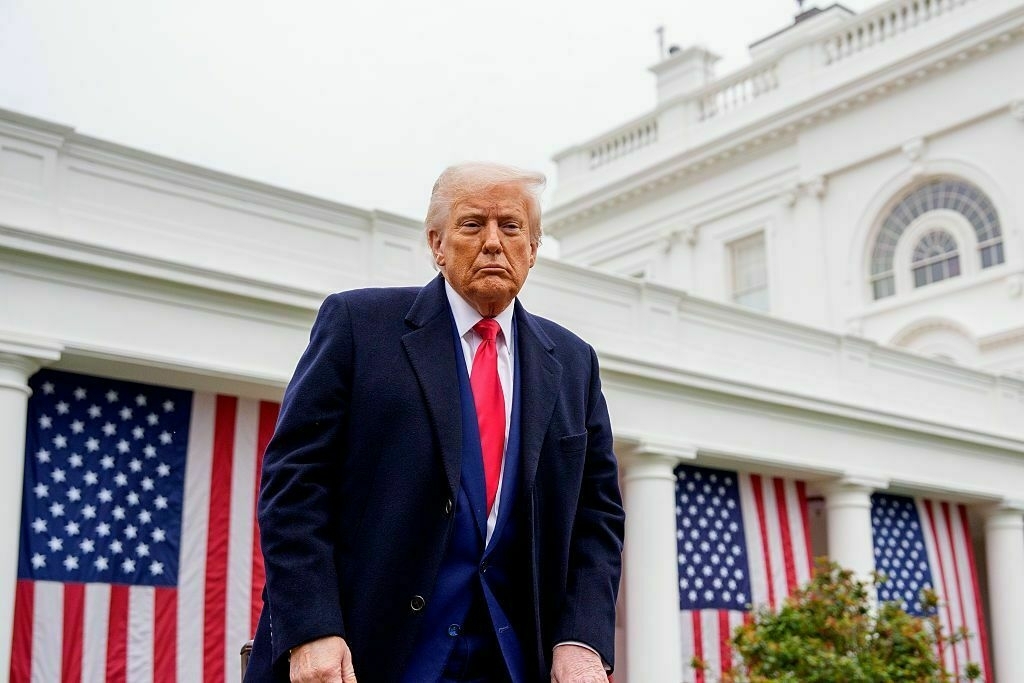
-
Record Aid From Partners in Ramstein. Trump's Ultimatum to Putin. 'Shadow' Russian Tanker Detained
-
U.S. Envoy Witkoff heads to Russia for high-stakes Ukraine ceasefire talks with Putin
In a swift move, U.S. Special Representative Steve Witkoff is heading back to Russia for another crucial meeting with President Putin today. This development was initially reported by Axios, supported by data from the air traffic monitoring service FlightRadar
This marks the third meeting between Putin and Witkoff in 2025. The main agenda is to negotiate a ceasefire in Ukraine and draft an agreement between Kyiv and Moscow. Last week, former President Trump expressed dissatisfaction with how the ceasefire negotiations were proceeding.
However, he recently acknowledged progress, although this sentiment is reportedly not shared by Ukraine.
Experts caution that if Putin does not agree to a truce by the end of April, Washington is prepared to impose new sanctions on Russia. During a NATO foreign ministers’ summit in Brussels, Senator Marco Rubio emphasized that U.S. patience is finite and urged Putin to respond swiftly.
Last week, Witkoff engaged in discussions with Putin’s representative, Kirill Dmitriev, in Washington. They reviewed the situation in Ukraine before Dmitriev returned to Moscow to brief Putin. According to sources, the Kremlin is only prepared to cease hostilities at sea, all while putting forth a set of demands.
The U.S. and Russia also agreed yesterday on a new prisoner exchange involving American and Russian citizen Kseniya Karelina. Trump disclosed that Karelina is the partner of a UFC fighter who personally appealed for Trump’s help.
-
Hockey celebrates Ovechkin, but Putin is the real winner
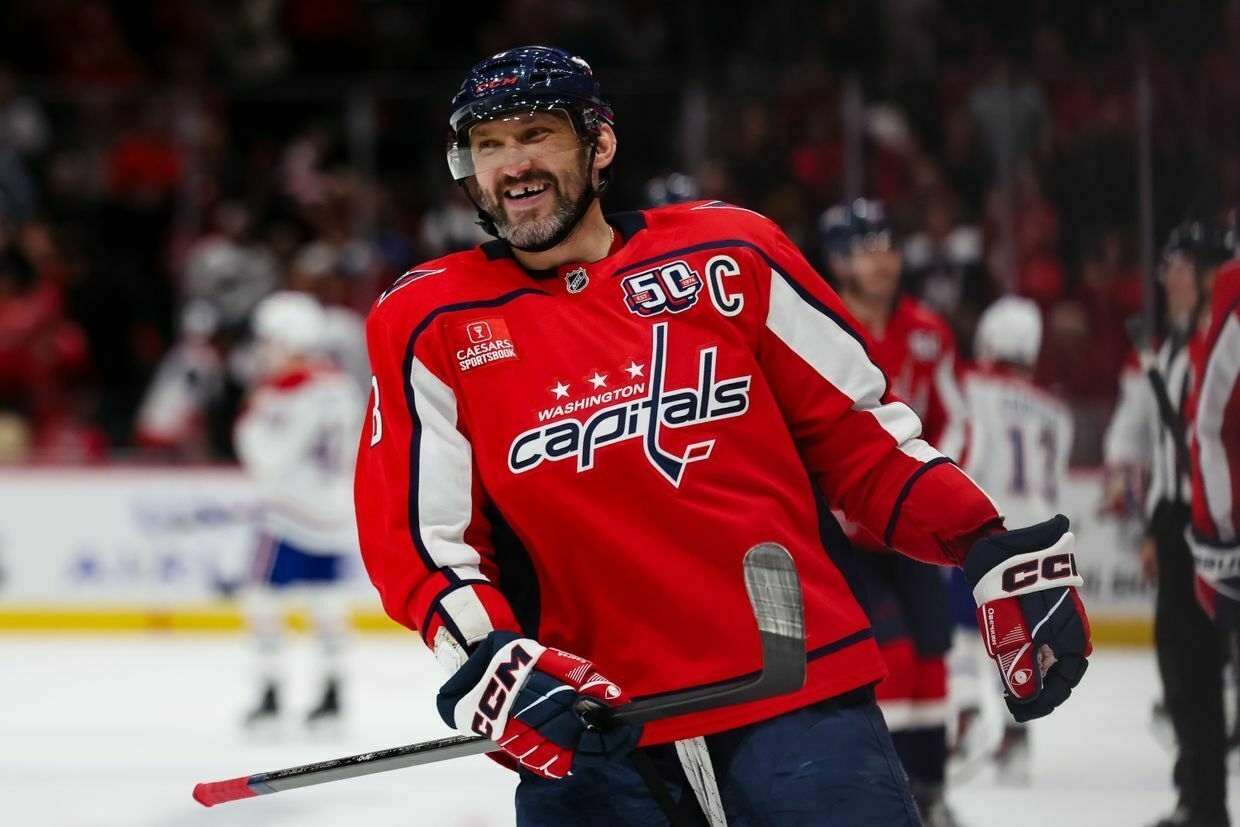
Alexander Ovechkin has become the greatest goal scorer in National Hockey League (NHL) history — an extraordinary accomplishment that cements his legacy as one of hockey’s most influential figures. For fans around the world, the Washington Capitals’ No. 8 stands as a symbol of perseverance, dedication, and success.
But beyond the ice, Ovechkin is deeply entangled in Russia’s propaganda machine. His public persona, shaped far beyond the confines of sport, reflects a fusion of Russian nationalism, loyalty to the Kremlin, and unwavering support for Russian President Vladimir Putin and his regime.
Ovechkin’s relationship with Putin is personal and well documented.
In the wake of Russia’s 2014 annexation of Crimea, Ovechkin appeared in a campaign called “Save Children from Fascism.” This campaign laid the groundwork for narratives about Ukraine’s so-called “denazification” — rhetoric later used to justify the forced deportation of Ukrainian children, a crime for which Putin has been charged by the International Criminal Court.
When Ovechkin married in 2016, Putin phoned in during the wedding reception to personally congratulate the newlyweds. Ovechkin interrupted the celebration to put the president on speakerphone. When Putin finished speaking, Ovechkin responded: “We all love and respect you.” The next year, he launched “PutinTeam,” a campaign endorsing Putin’s presidential candidacy.
Despite living in the West for much of his career, Ovechkin has maintained close ties to his Russian roots. His connection to Putin is deeply ingrained — shaped by upbringing, a nationalistic worldview, and a strong sense of patriotic duty.
Ovechkin’s political role is no accident. Throughout Russian history, prominent athletes have been elevated as national symbols. During the Soviet era, they were awarded state honors and military titles that cemented their loyalty to the regime. That tradition continues in post-Soviet Russia.
Putin has also personally met with Ultimate Fighting Championship (UFC) fighter Khabib Nurmagomedov after his triumph over Conor McGregor — who, in the Kremlin narrative, represented Western decadence. Khabib, a Muslim from the North Caucasus, was celebrated as a humble, traditional hero, reinforcing Russia’s self-image as morally superior to the West.
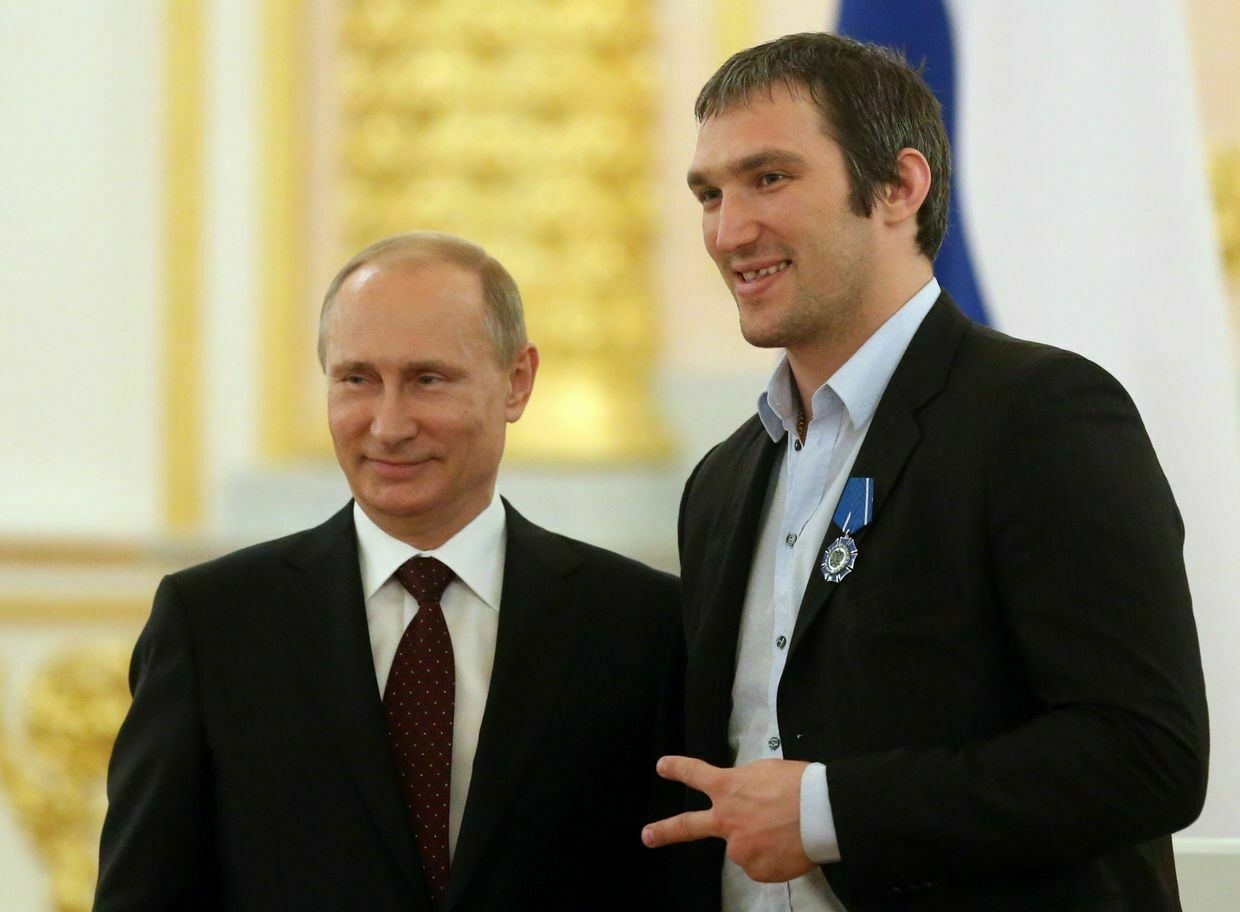
Russian President Vladimir Putin (L) and Russian ice hockey player Alexander Ovechkin (R) during a reception for the national team that won the 2014 Ice Hockey World Championship, in the Kremlin, Moscow, Russia on May 27, 2014. (Sasha Mordovets / Getty Images) To the Kremlin, athletes like Ovechkin aren’t merely entertainers — they are instruments of soft power. With global recognition and widespread appeal, Ovechkin is the perfect figure to project an image of Russia that is strong, resilient, and unyielding. It’s not just about hockey. It’s about manipulating a global audience through the charisma of a sports icon.
As Slava Malamud, a former sports journalist whose NHL press credentials were revoked by the Washington Capitals after he repeatedly questioned Ovechkin’s silence on the war in Ukraine, put it in an interview with Sportsnet: “In Russia, the athlete is never just an athlete. They’re an extension of the state, performing for the cameras, pushing the agenda that benefits the Kremlin and its grip on power.”
The media frenzy surrounding Ovechkin’s record-breaking pursuit — branded “The GR8 Chase” by the NHL, complete with a bespoke logo and youth-focused promotional events — was eagerly mirrored by the Kremlin. In Russia, it became a symbolic triumph on Western soil.
On the night Ovechkin passed Wayne Gretzky with his 895th goal, Moscow’s Soviet-era Ostankino TV tower — completed shortly after the Cuban Missile Crisis — was illuminated with his image. Billboards across Russia showed Ovechkin in his NHL uniform, conspicuously omitting the Washington Capitals insignia. Kremlin-aligned broadcasters and nationalist bloggers hailed the moment as evidence of Russia’s enduring global prowess, despite Western efforts to isolate the country over its invasion of Ukraine.
But perhaps the moment of greatest symbolic significance, particularly for a hockey devotee like Putin, came in Ovechkin’s post-record remarks.
He didn’t thank the United States — the country that gave him a platform, a home, and a fortune. He didn’t acknowledge the NHL for allowing Russian players to continue competing after the full-scale invasion of Ukraine. Instead, he thanked Russians.
And yet, much of the hockey world celebrates without pause for reflection. The applause is loud. The silence about what Ovechkin represents is even louder.
Editor’s Note: The opinions expressed in the op-ed section are those of the authors and do not necessarily reflect the views of the Kyiv Independent.
Trump’s tariffs risk disaster while bipartisan Russia strategy offers hopeThere is unfortunately absolutely nothing good to say about the announcements U.S. President Donald Trump made during his recent “Liberation Day” event in the White House Rose Garden. Try as one might to “sane-wash” Trump’s economic policies, there is simply no coherent rationale for his supposedly…The Kyiv IndependentSimon Johnson
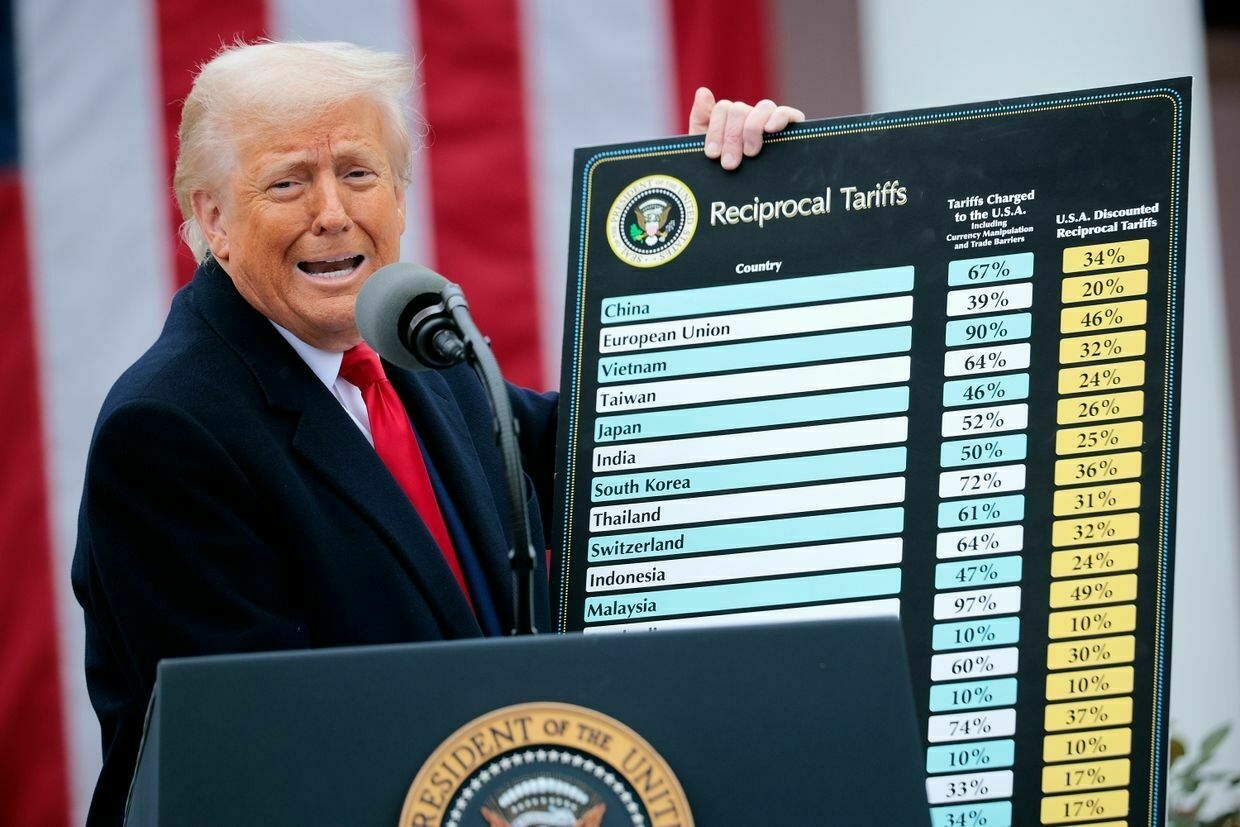
-
Putin to meet US envoy Witkoff to discuss Ukraine, Kremlin confirms
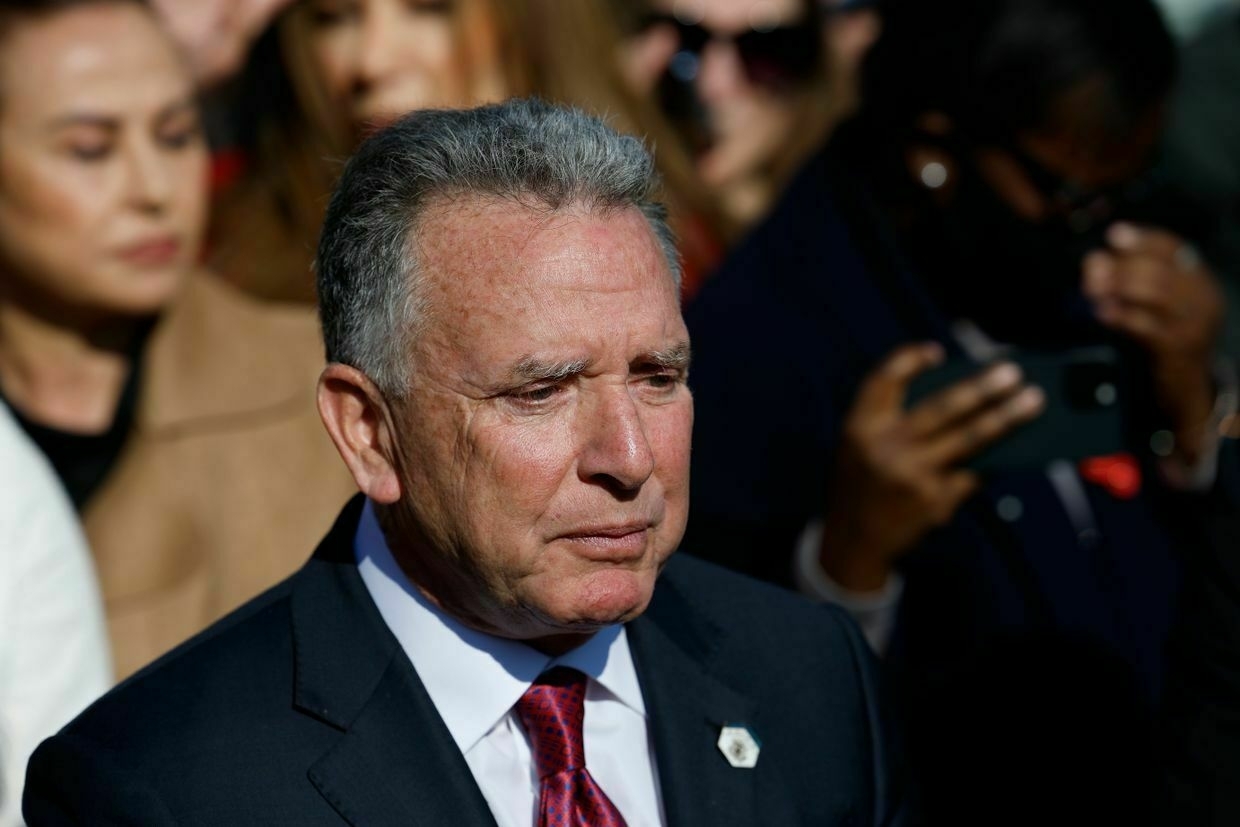
Russian President Vladimir Putin will meet U.S. President Donald Trump’s special envoy Steve Witkoff on April 11 to discuss a path toward a settlement in Ukraine, the Kremlin’s spokesperson said, according to the state-owned news agency TASS.
Witkoff, who has led Trump’s effort to broker a ceasefire between Moscow and Kyiv, has arrived in Russia for his third meeting with the Russian leader.
During his visit, the U.S. official has already met with Kirill Dmitriev, Putin’s envoy for economic cooperation, who met Witkoff last week in Washington. The two held a meeting in St. Petersburg, where Putin is scheduled to attend a meeting on the development of the Russian Navy.
Kremlin spokesperson Dmitry Peskov tempered expectations of the upcoming talks, calling them a continuation of diplomatic efforts that is unlikely to bring a major breakthrough.
A possible meeting between Trump and Putin could be on the agenda, Peskov said.
The talks come as Trump’s push for a ceasefire remains deadlocked. Russia has rejected a full 30-day truce agreed upon by Washington and Kyiv in March and continues to violate the partial energy ceasefire that followed.
Trump, who initially avoided criticizing Putin, has since adopted more aggressive language, saying he was “pissed off” and “very angry” over Moscow’s continued attacks on Ukraine and Putin’s personal hostility toward President Volodymyr Zelensky.
Despite repeated threats of additional sanctions and tariffs, the U.S. has yet to implement new punitive measures against Moscow.
The April 11 meeting follows a second round of diplomatic talks in Istanbul between U.S. and Russian officials focused on embassy operations. The war in Ukraine was reportedly not discussed.
‘Putin is pure evil’ — Trump’s spiritual advisor on Russia’s war against UkraineWhen U.S. President Donald Trump paused military aid to Ukraine last month, the man described as his “spiritual advisor,” Pastor Mark Burns, backed the decision. This week, Burns is urging him to send Kyiv more tanks, fighter jets, and air defense. “I now believe that supporting Ukraine is AmericaThe Kyiv IndependentChris York
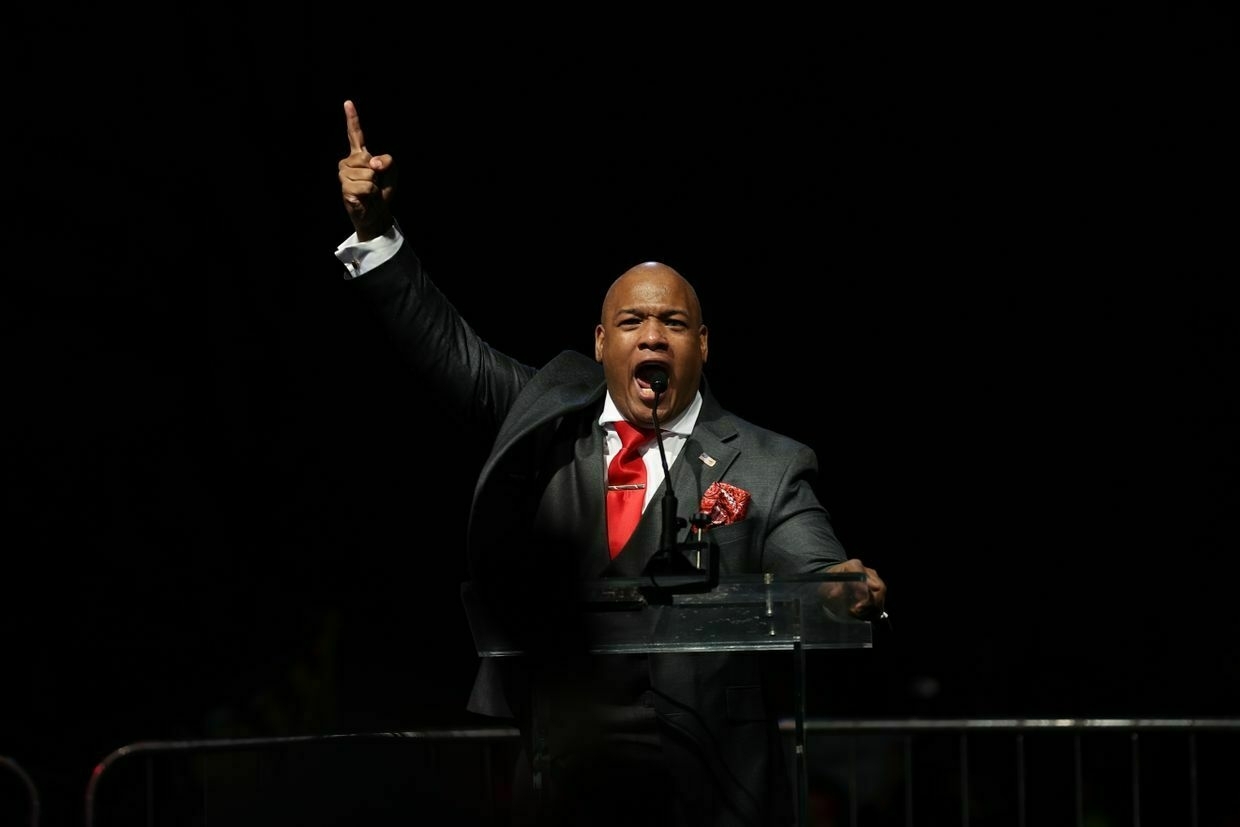
-
5 key steps for Europe to bolster defense against Russia
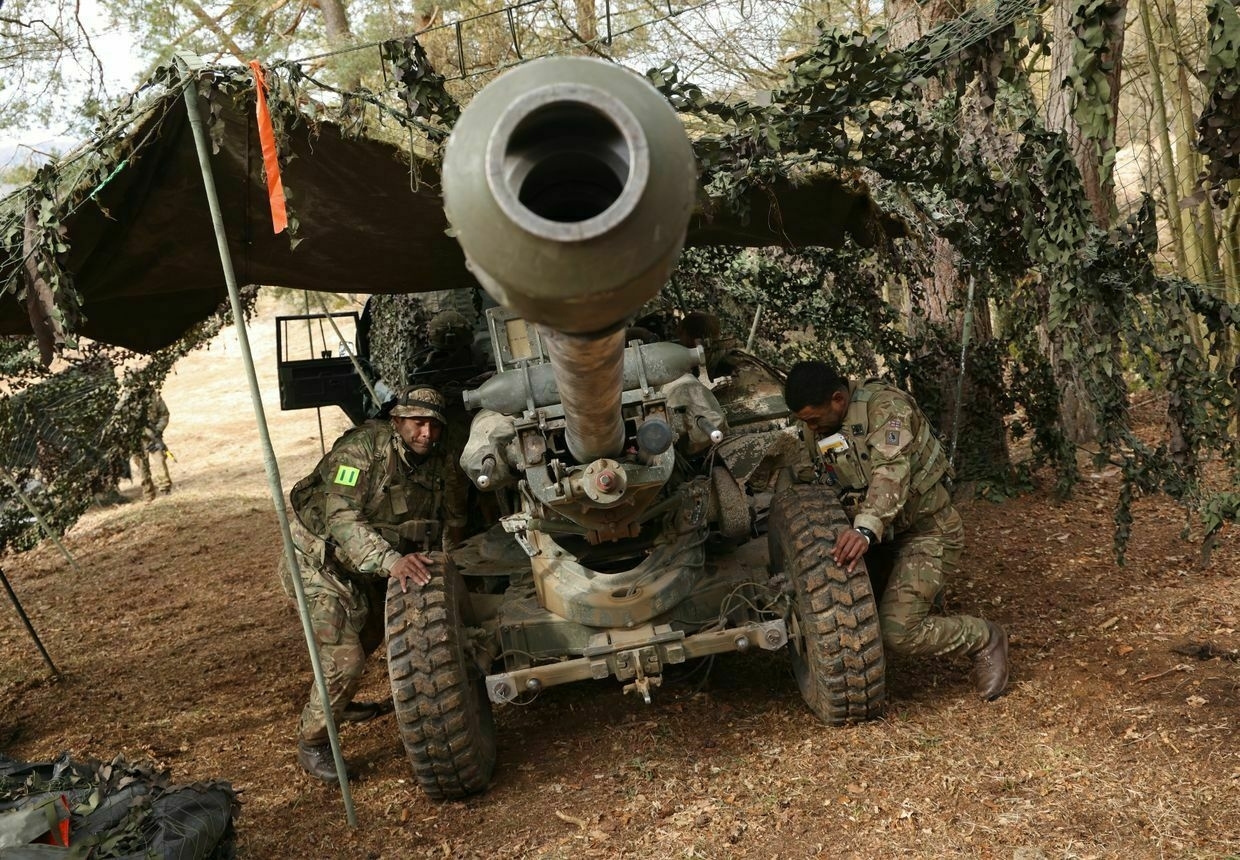
The European Commission recently unveiled a plan for rearming the European Union and strengthening the bloc’s defense capabilities. By 2030, the Commission intends to arm Ukraine and develop member states’ militaries to the extent needed to deter or counter Russian aggression. To fund this effort, the Commission plans to borrow 800 billion euros ($873 billion) over the next four years.
It is encouraging that Europe has finally woken up to the Russian threat and developed a credible medium-term defense strategy, especially as the transatlantic rift widens. But the bloc may not have as much time to prepare as it would like. Fortunately, there are ways to accelerate the plan’s implementation.
Perhaps the most important question concerns funding. Around one-quarter of the 800 billion euros that the Commission wants to mobilize can be obtained immediately by exchanging frozen Russian assets (90% of which are in cash) for EU bonds. Given the reluctance of some member states to seize Russian state assets, exchanging them for, say, 20-year, zero-interest bonds could be a politically palatable compromise.
More generally, there is little to suggest that the seizure or exchange of these assets would materially affect the euro or the rule of law in Europe. In fact, it may even increase the likelihood of ultimately collecting compensation from Russia for the damages caused by its aggression.
Second, while information and soft-power threats may be less tangible than the cyber threats that the Commission’s plan rightly emphasizes, they are just as dangerous and must be addressed. A prime example is the rising popularity of far-right and far-left populist forces supported by Russian and Chinese influence operations on TikTok and other social-media platforms. These political parties often promote the Kremlin’s agenda, including ending support for Ukraine.
The consequences of such forces coming to power could be devastating. Aside from aligning with Russia, their inclination to implement simplistic solutions to complex problems would create uncertainty and chaos, undermining the EU’s governing institutions and its internal cohesion. This institutional weakness and fractured unity would only spur Russian aggression.
Freedom of speech should not apply to disinformation peddlers. The EU must therefore ban Russian and Russia-related media, including seemingly independent outlets, and more closely monitor the use of TikTok, Telegram, and other social-media platforms for potential dissemination of pro-Kremlin propaganda. European politicians with ties to Russian President Vladimir Putin, like those who lobbied for the Nord Stream II project, should also face repercussions, so that the domestic costs outweigh the benefits conferred by these connections.
Similarly, the governance mechanisms of Europe’s rearmament effort should be “Orbán-proof” to prevent a single Kremlin-aligned European country – such as Hungary under Prime Minister Viktor Orban — from derailing the project. Creating a “coalition of the willing” would also allow Canada, Japan, South Korea, and other countries to join the effort.
To be sure, Russian influence campaigns are not the only or even the main reason why populist far-right parties have gained traction in Europe. To erode support for these parties, European leaders must address the genuine problems that have fueled their rise. For example, European leaders can weaken anti-immigrant sentiment by reforming migrant-support programs in ways that encourage employment, such as by coupling integration services (including language training) with the gradual phase-out of social benefits.
The bloc can also counter populism by improving outcomes for European workers and economies. The very act of rearming will create new jobs, while soft-power efforts could also benefit European industry. The “Grain from Ukraine” humanitarian program, which supplies Ukrainian products to countries in Africa and Asia facing food shortages, could easily be expanded to include European foodstuffs (which the EU can finance through its Common Agricultural Policy).
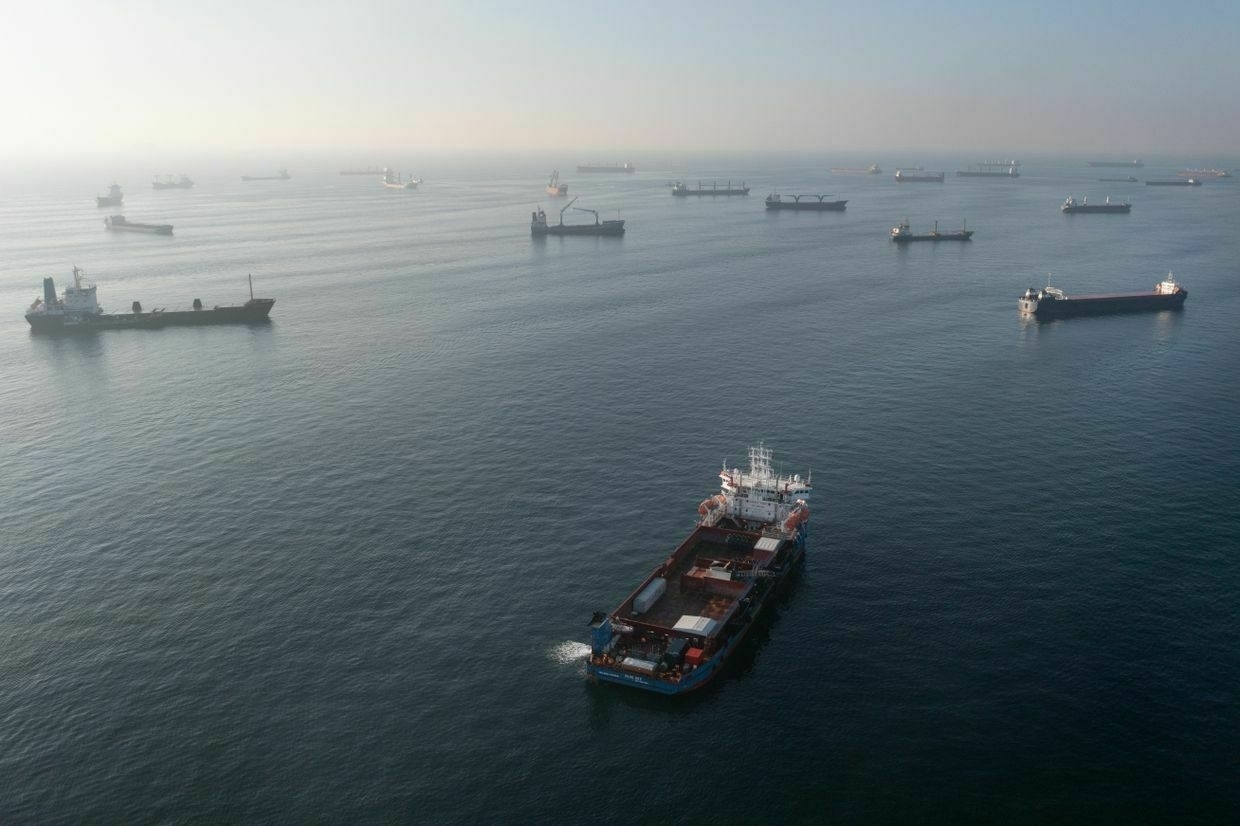
Ships, including those carrying grain from Ukraine and awaiting inspections, are seen anchored off the Istanbul coastline in Istanbul, Turkey, on Nov. 2, 2022. (Chris McGrath / Getty Images) Lastly, the EU should use options other than hard force to mitigate the strategic threat posed by Russia. For example, EU leaders could discreetly assure the leaders of nations currently occupied by Russia of the bloc’s recognition of them as independent states. This has worked before: Polish leaders privately told Leonid Kravchuk, who subsequently became Ukraine’s first president, that Poland would recognize an independent Ukrainian state.
Russia may seem like a powerful monolith, but in reality it is a paper tiger with a crumbling economy. Regional elites will soon realize that they no longer have to tolerate the Kremlin’s racism, economic exploitation, and expansionism. In fact, many free countries (including Poland and Finland) emerged from the disintegration of the Russian Empire in 1917, after its defeat in World War I, and from the collapse of the Soviet Union in 1991, after its withdrawal from Afghanistan two years earlier. Extending the life of an imperial entity that is seemingly permanently at war makes little sense.
The EU must take these steps alongside its rearmament efforts — regardless of any negotiations or ceasefire agreements. Russia has shown that it can talk for years, as it did between 2015-22, to no effect, and Putin will use any ceasefire to prepare for another attack, while also intensifying Russia’s hybrid warfare, including information operations and sabotage. Putin’s imperial ambitions will not be derailed by talking, and any hope of “striking a deal” with Russia will only help him reach these goals. If Europe wants to live freely, it must act fast.
Editor’s Note: Copyright, Project Syndicate. This article was published by Project Syndicate and has been republished by the Kyiv Independent with permission. The opinions expressed in the op-ed section are those of the authors and do not necessarily reflect the views of the Kyiv Independent.
Trump’s tariffs risk disaster while bipartisan Russia strategy offers hopeThere is unfortunately absolutely nothing good to say about the announcements U.S. President Donald Trump made during his recent “Liberation Day” event in the White House Rose Garden. Try as one might to “sane-wash” Trump’s economic policies, there is simply no coherent rationale for his supposedly…The Kyiv IndependentSimon Johnson
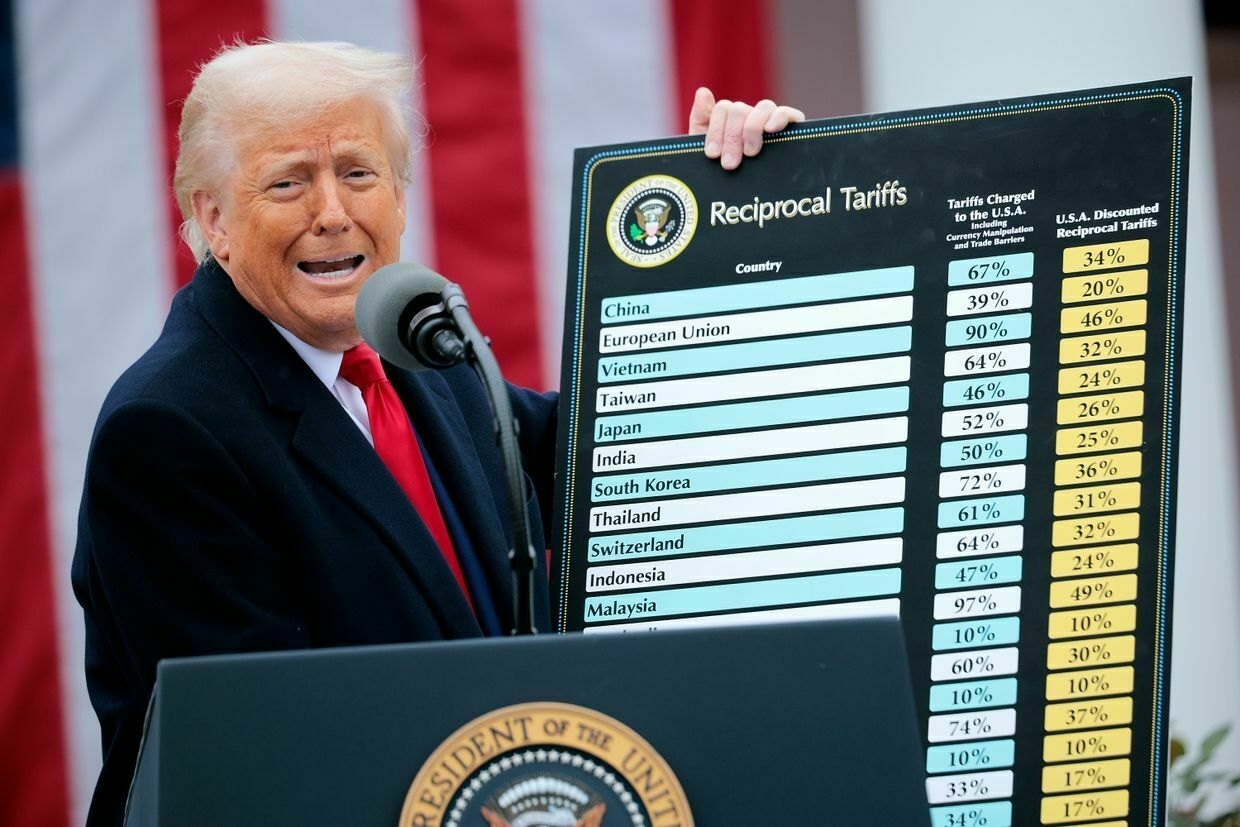
-
Russia might try to secure deal with US on May 9, Estonian defense minister says
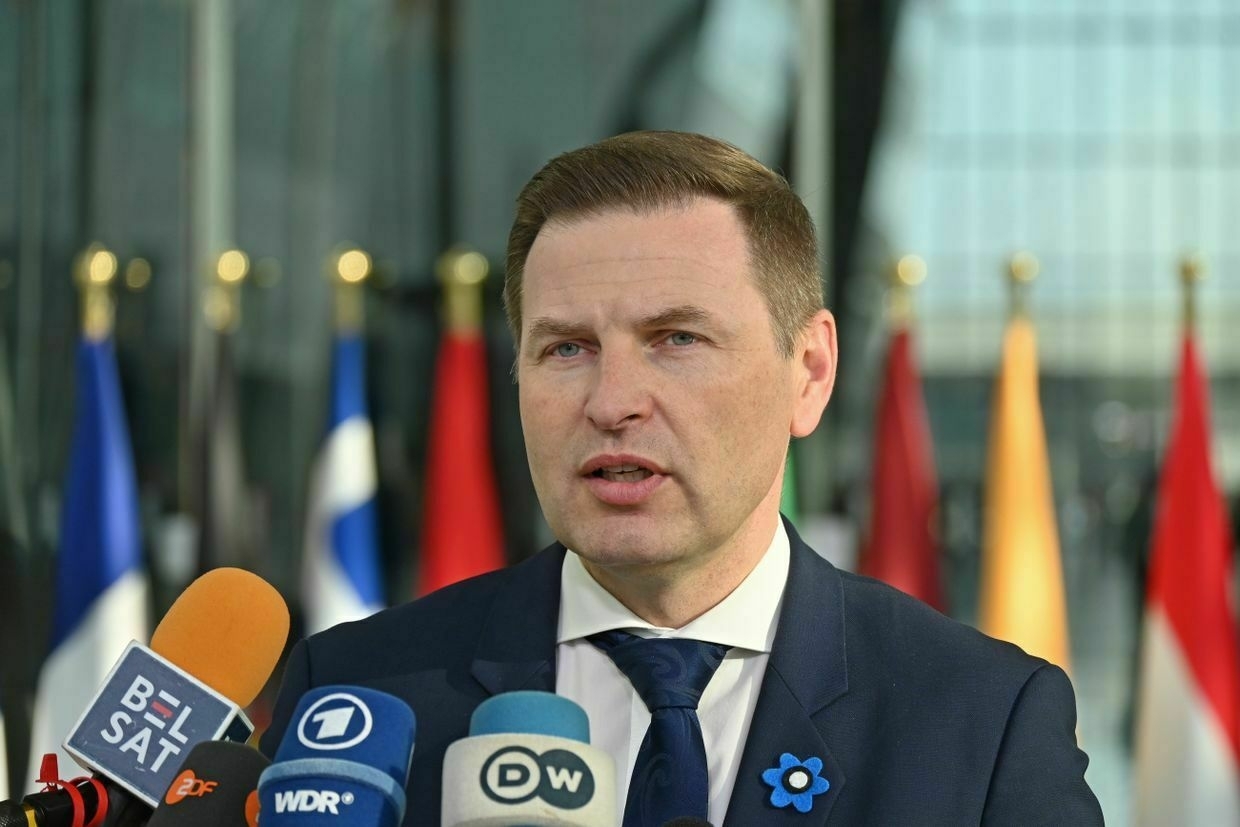
Moscow may attempt to strike some kind of a ceasefire deal with the U.S. on May 9, the day Russia celebrates victory in World War II, Estonian Defense Minister Hanno Pevkur said on April 11.
“Take the Feb. 24 (when Russia launched its full-scale invasion of Ukraine). Feb. 23 is the day of Russian Army. For the Kremlin, always, dates are very important,” Pevkur told journalists in Brussels.
“So this is why I believe that also May 9, which is for us, the day of Europe, for Russia is the day of ending the Second World War, they will strive probably towards this to get some kind of deal, some kind of ceasefire or whatever."
U.S. President Donald Trump has sought to broker a ceasefire and a broader peace deal to end Russia’s all-out war against Ukraine. Moscow has rejected a 30-day truce agreed upon by Washington and Kyiv, and the partial ceasefire on strikes against energy facilities has failed to prevent continued attacks.
Estonia’s defense chief argued that this potential deadline should incentivize Kyiv’s partners to speed up military support.
The comments come as representatives of some 40 countries meet in Brussels for the 27th meeting of the Ukraine Defense Contact Group, with the allies promising “billions” in additional support.
European leaders are likely to seek to reassure Ukraine’s Defense Minister Rustem Umerov about their continued commitment as the U.S. support grows increasingly uncertain under the Trump administration.
A day earlier, Brussels hosted a meeting of the “coalition of the willing,” an informal group led by the U.K. and France that seeks to provide Ukraine with post-war security guarantees, including a potential deployment of peacekeeping troops.
Pevkur voiced support for the initiative but said it should not come at the expense of weakening NATO’s eastern frontier.
‘Today we will pledge billions’ for Ukraine — allies begin Ramstein-format meeting in BrusselsU.S. Defense Secretary Pete Hegseth and Ukraine’s President Volodymyr Zelensky would join the meeting, co-chaired by Germany and the U.K., through a video conference, German Defense Minister Boris Pistorius told journalists.The Kyiv IndependentMartin Fornusek
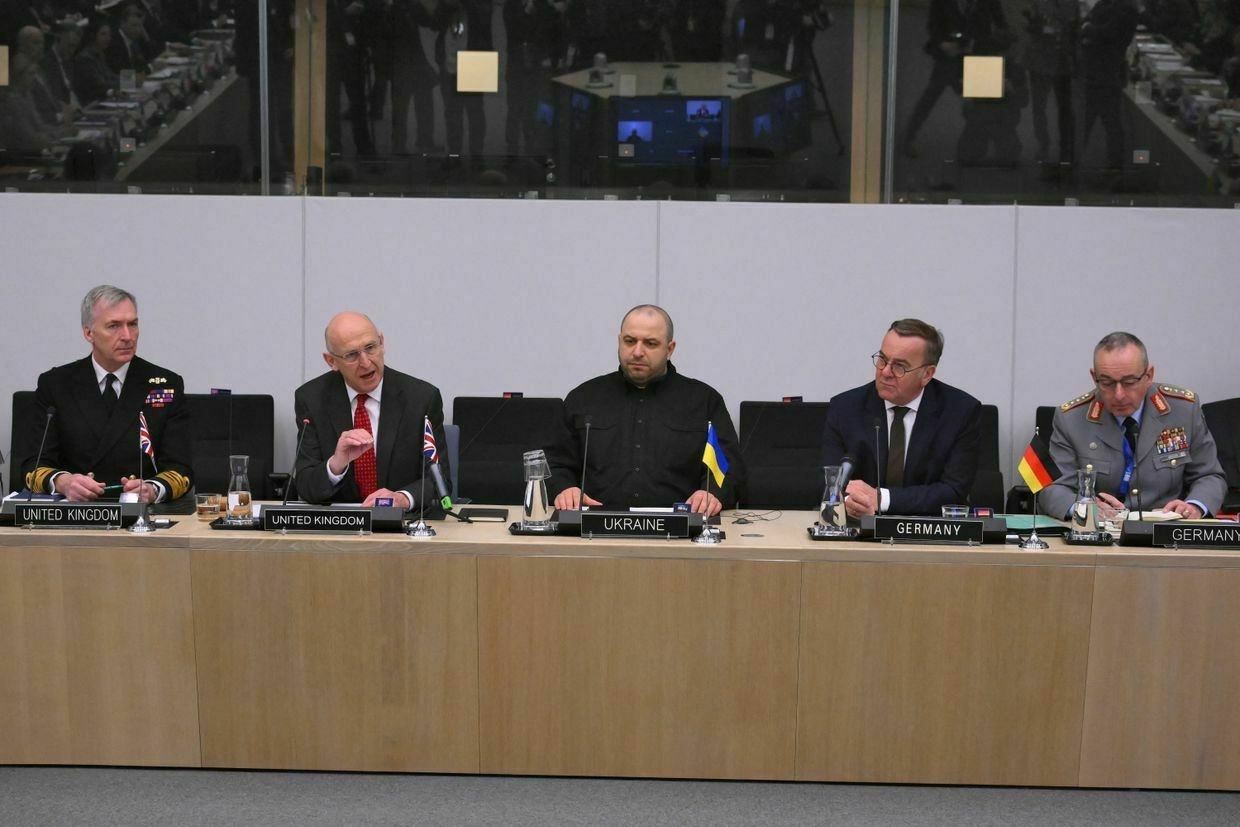
-
'Today we will pledge billions' for Ukraine — allies begin Ramstein-format meeting in Brussels
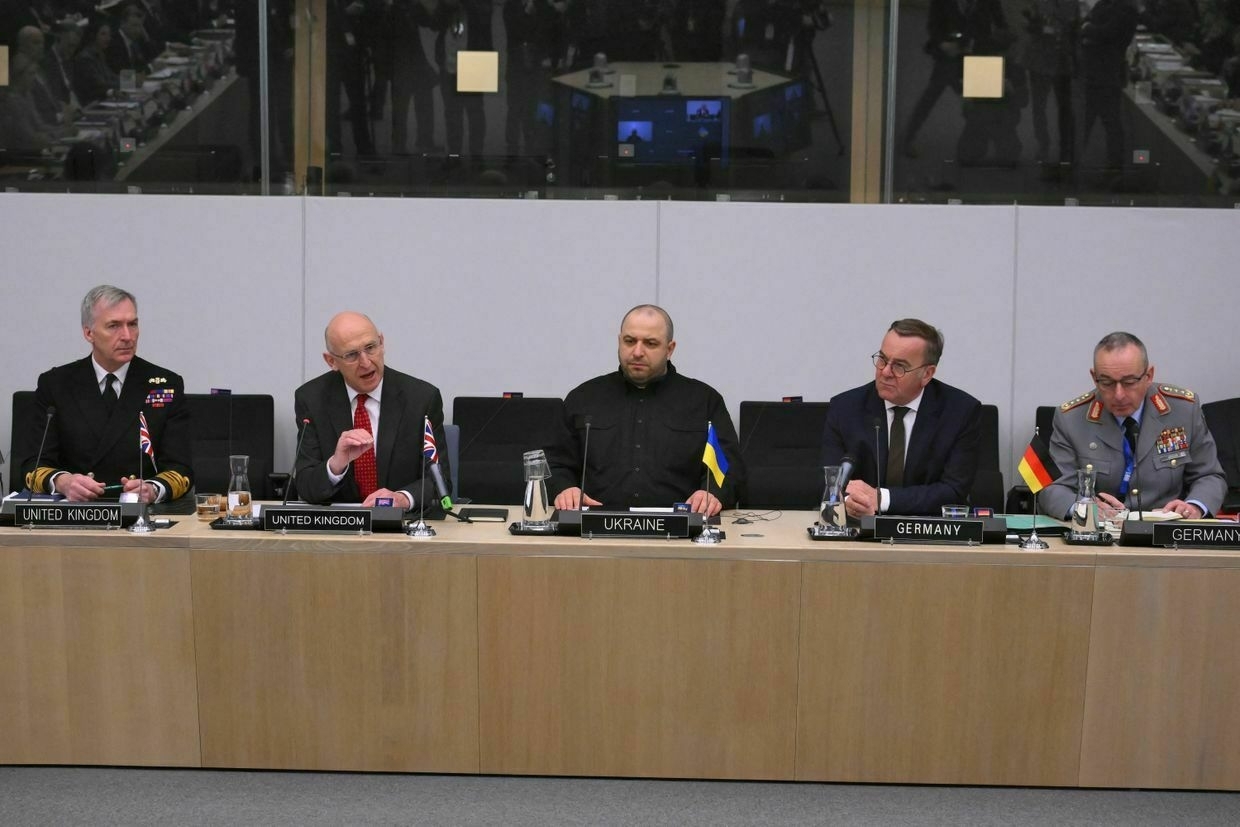
The 27th meeting of the Ukraine Defense Contact Group (UDCG) in Brussels on April 11 will gather representatives of some 40 countries, including the U.S., German Defense Minister Boris Pistorius told journalists.
U.S. Defense Secretary Pete Hegseth and Ukraine’s President Volodymyr Zelensky would join the meeting, co-chaired by Germany and the U.K., through a video link, Pistorius added.
The Ramstein-format meeting comes at a pivotal time for the pro-Ukraine coalition. The U.S. has signaled reduced commitment to Europe’s and Ukraine’s security, and European parties scramble to shore up support for Kyiv as it faces Russian aggression.
Sitting with Pistorius and Ukrainian Defense Minister Rustem Umerov, U.K. Defense Secretary John Healey reminded that the previous summit in February saw the allies commit almost $2 billion in aid.
“Today we will pledge billions more”, Healey told journalists at the start of the summit.
The U.K. and Norway have already committed an additional 450 million pounds ($585 million) in military support, while Germany pledged four new IRIS-T air defenses, armored vehicles, missiles, shells, and other support.
“Air defenses are our priority, and it is very important that our partners hear us,” President Volodymyr Zelensky said.
“Partners can help with this, as well as to speed up the implementation of previous agreements. The Patriots, which are now simply stored somewhere by partners, should actually protect lives."
The UDCG was launched by former U.S. Defense Secretary Lloyd Austin in 2022, delivering some $126 billion in military support to Ukraine from roughly 50 countries.
U.S. President Donald Trump’s accession to office in January brought a major shift in the U.S.’s foreign policy. The new administration has yet to approve any new aid package for Kyiv and instead seeks to broker a peace agreement with Russia.
The 26th Ramstein format meeting on Feb. 12, the first summit since Trump took office, was also the first UDCG meeting not chaired by the U.S. defense secretary as Hegseth passed the role to his British counterpart Healey.
‘Putin is pure evil’ — Trump’s spiritual advisor on Russia’s war against UkraineWhen U.S. President Donald Trump paused military aid to Ukraine last month, the man described as his “spiritual advisor,” Pastor Mark Burns, backed the decision. This week, Burns is urging him to send Kyiv more tanks, fighter jets, and air defense. “I now believe that supporting Ukraine is AmericaThe Kyiv IndependentChris York
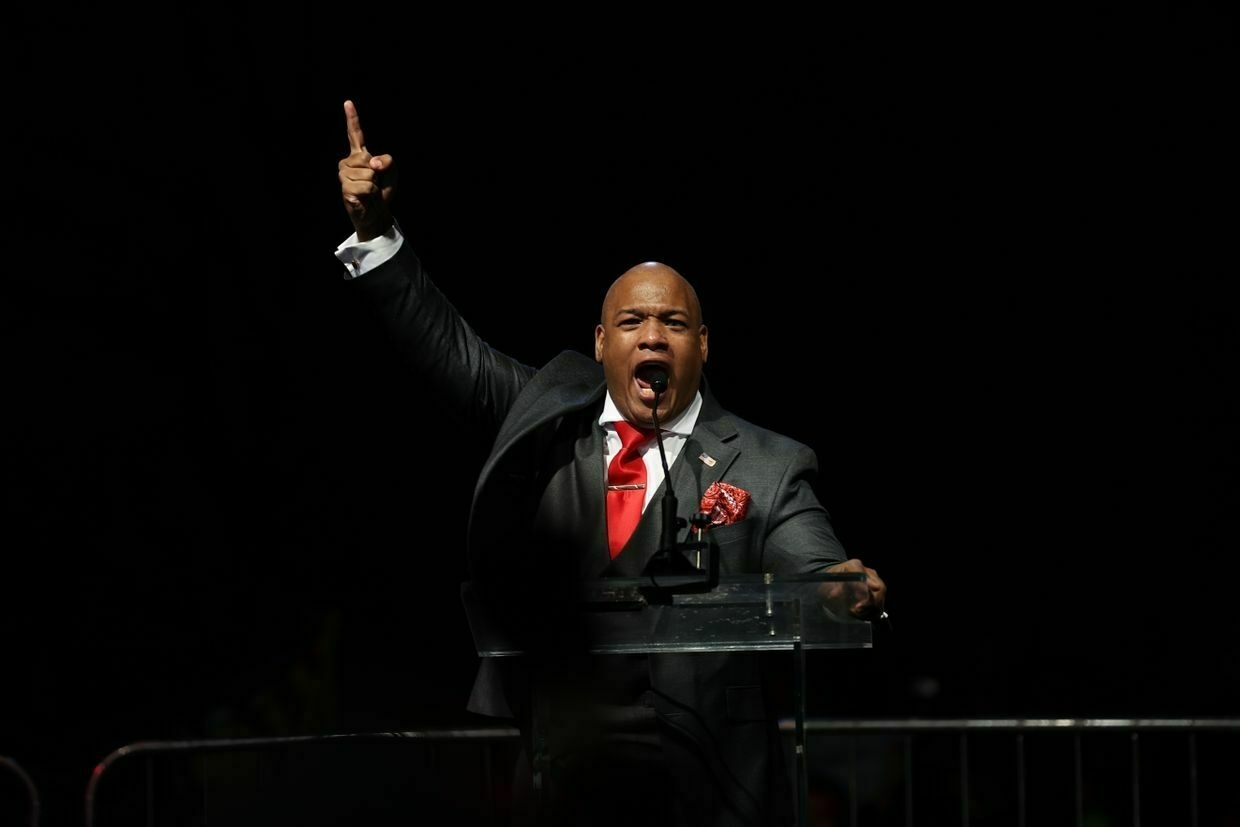
-
Trump may impose new Russia sanctions if ceasefire not reached by end of April, Axios reports
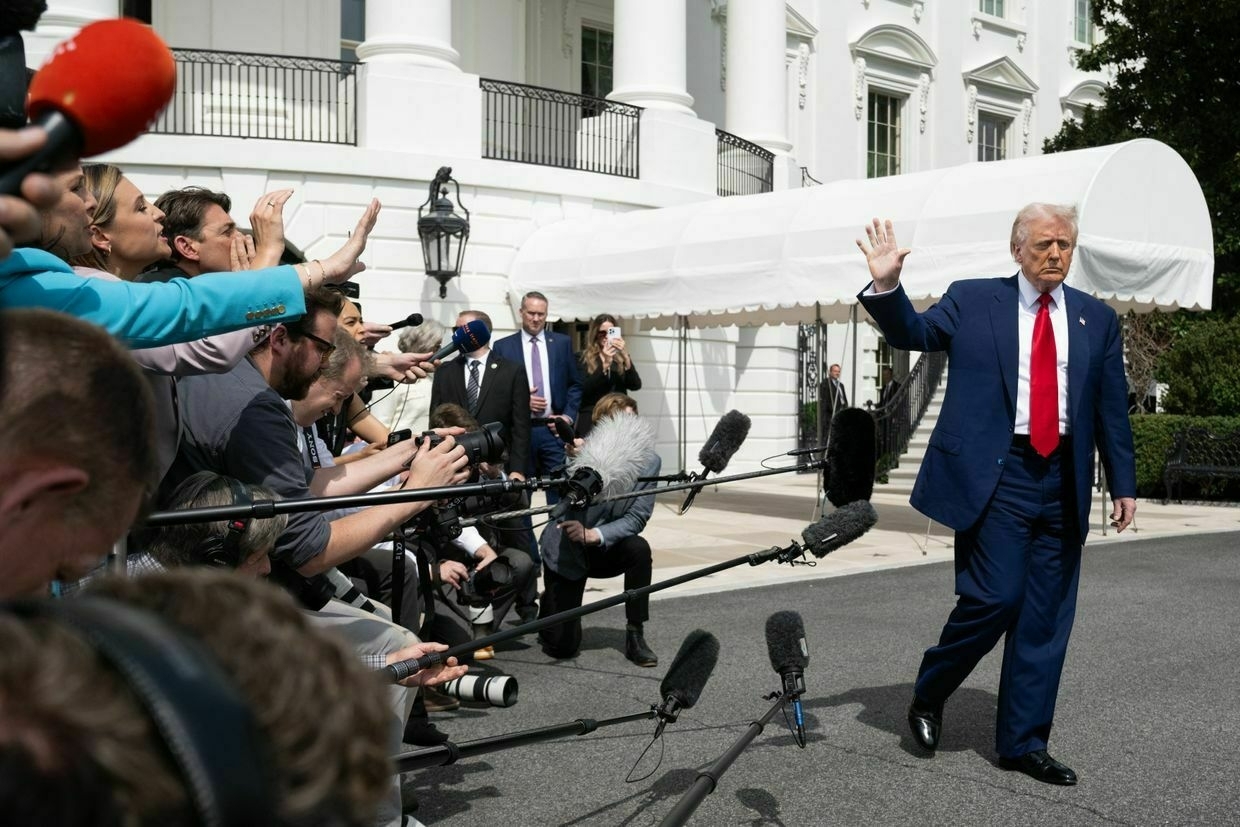
U.S. President Donald Trump could impose additional sanctions on Russia if a ceasefire with Ukraine is not reached by the end of April, Axios reported on April 11, citing an undisclosed source.
The warning follows Ukraine’s agreement to a full 30-day ceasefire on March 11 during talks with the U.S. in Saudi Arabia. Russia rejected the proposal unless it included restrictions on Ukraine’s Armed Forces and an end to foreign military aid.
The impasse has led to growing frustration in Washington. Trump has adopted increasingly forceful rhetoric, saying he is “pissed off” and “very angry” at Russian President Vladimir Putin over continued strikes and attacks on the credibility of President Volodymyr Zelensky.
Although a partial truce covering energy infrastructure remains in effect, both sides have accused each other of violating the agreement.
Steve Witkoff, Trump’s special envoy for the Middle East, traveled to Russia on April 11 to meet with Putin, marking their third meeting, Axios reported.
The visit comes days after Putin’s envoy, Kirill Dmitriev, traveled to Washington, expressing “cautious optimism” about renewed contacts.
Despite repeated threats, the Trump administration has yet to impose new sanctions on Russia. The White House previously paused all military and intelligence assistance to Ukraine in March, pressuring Kyiv to agree to a minerals-for-access deal.
U.S. and Russian officials also held talks in Istanbul on April 10 about embassy operations. The same day, the two countries conducted a prisoner exchange, with Russia releasing U.S.-Russian national Ksenia Karelina in return for German-Russian citizen Artur Petrov.
Ukraine was reportedly not on the Istanbul talks' agenda, but the U.S. and Russia have held two rounds of direct discussions on peace in Ukraine in Saudi Arabia since February.
‘Putin is pure evil’ — Trump’s spiritual advisor on Russia’s war against UkraineWhen U.S. President Donald Trump paused military aid to Ukraine last month, the man described as his “spiritual advisor,” Pastor Mark Burns, backed the decision. This week, Burns is urging him to send Kyiv more tanks, fighter jets, and air defense. “I now believe that supporting Ukraine is AmericaThe Kyiv IndependentChris York
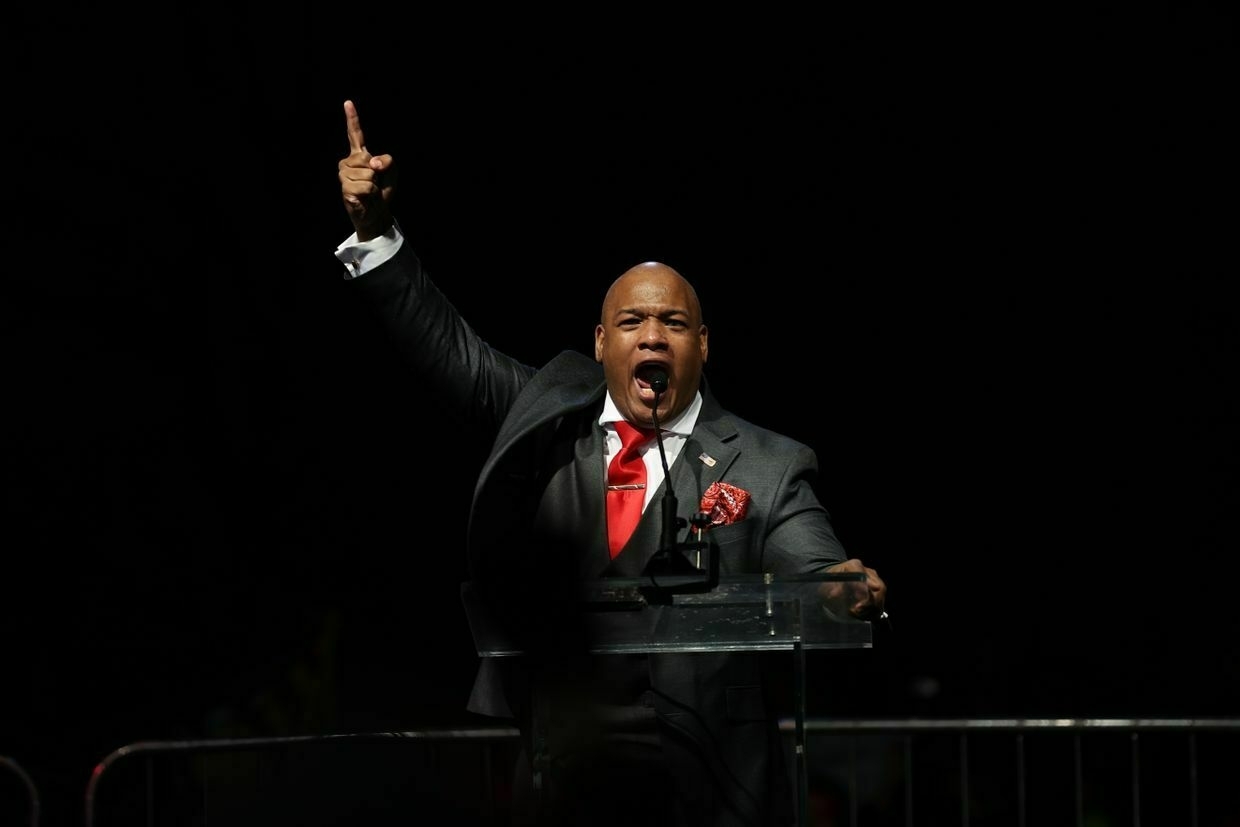
-
6 countries ready to send troops for Ukraine 'reassurance force' so far, AFP reports
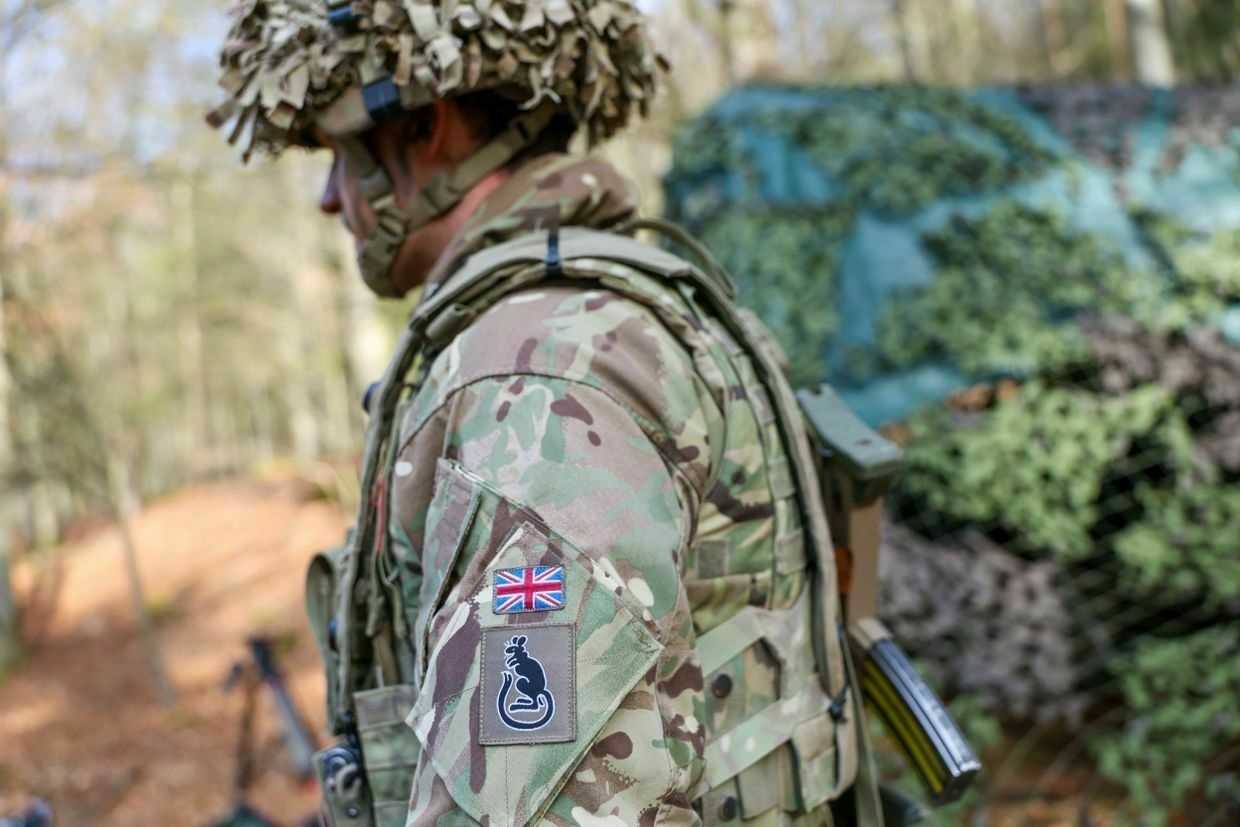
Only six countries have said so far that they are ready to deploy troops to Ukraine as part of the international “coalition of the willing” in case of a ceasefire, AFP reported on April 10, citing undisclosed European officials.
The U.K., France, the Baltic nations, and another unnamed country stand ready to send their soldiers, while other leaders want to see a more detailed plan before making commitments, according to the news agency.
AFP’s figure suggests that the number of willing countries is much lower than earlier reported. On April 9, Bloomberg wrote that 15 nations are open to sending their troops.
The British- and French-led coalition’s meeting in Brussels on April 10 shed further details on the so-called reassurance force. U.K. Defense Secretary John Healey explained that the troops would be primarily tasked with strengthening Ukraine’s military rather than operating as a traditional peacekeeping force separating the two belligerent sides.
In spite of this, many leaders of some 30-member strong coalition require more flashed out mission details.
“What is the mandate? What would we do in the different scenarios, for example, if there would be any escalation regarding Russia?” Dutch Defense Minister Ruben Brekelmans said, according to AFP.
“It’s helpful if there’s a clarity of what that mission would entail, and what do we do — if we are peacekeeping, deterrence or reassurance,” Swedish Defense Minister Pal Jonson said.
Coalition members unwilling to commit ground troops have been reportedly asked to provide other types of support, including intelligence, arms, or naval forces.
Another major hurdle is the U.S. participation, which London sees as a necessary condition for effective deterrence against Russia.
U.S. President Donald Trump’s administration has signaled intent to reduce U.S. military presence in Europe and ruled out sending troops as part of the reassurance force. London and Paris are seeking to convince Washington to at least provide airpower or intelligence support but have so far failed to extract any commitments.
Since taking office, Trump has sought to broker a peace deal in Ukraine while resuming direct communications with Moscow. The efforts to negotiate a ceasefire have largely stalled as Russia rejected a full 30-day truce backed by Kyiv and repeatedly violated the partial halt on strikes against energy infrastructure.
‘Putin is pure evil’ — Trump’s spiritual advisor on Russia’s war against UkraineWhen U.S. President Donald Trump paused military aid to Ukraine last month, the man described as his “spiritual advisor,” Pastor Mark Burns, backed the decision. This week, Burns is urging him to send Kyiv more tanks, fighter jets, and air defense. “I now believe that supporting Ukraine is AmericaThe Kyiv IndependentChris York
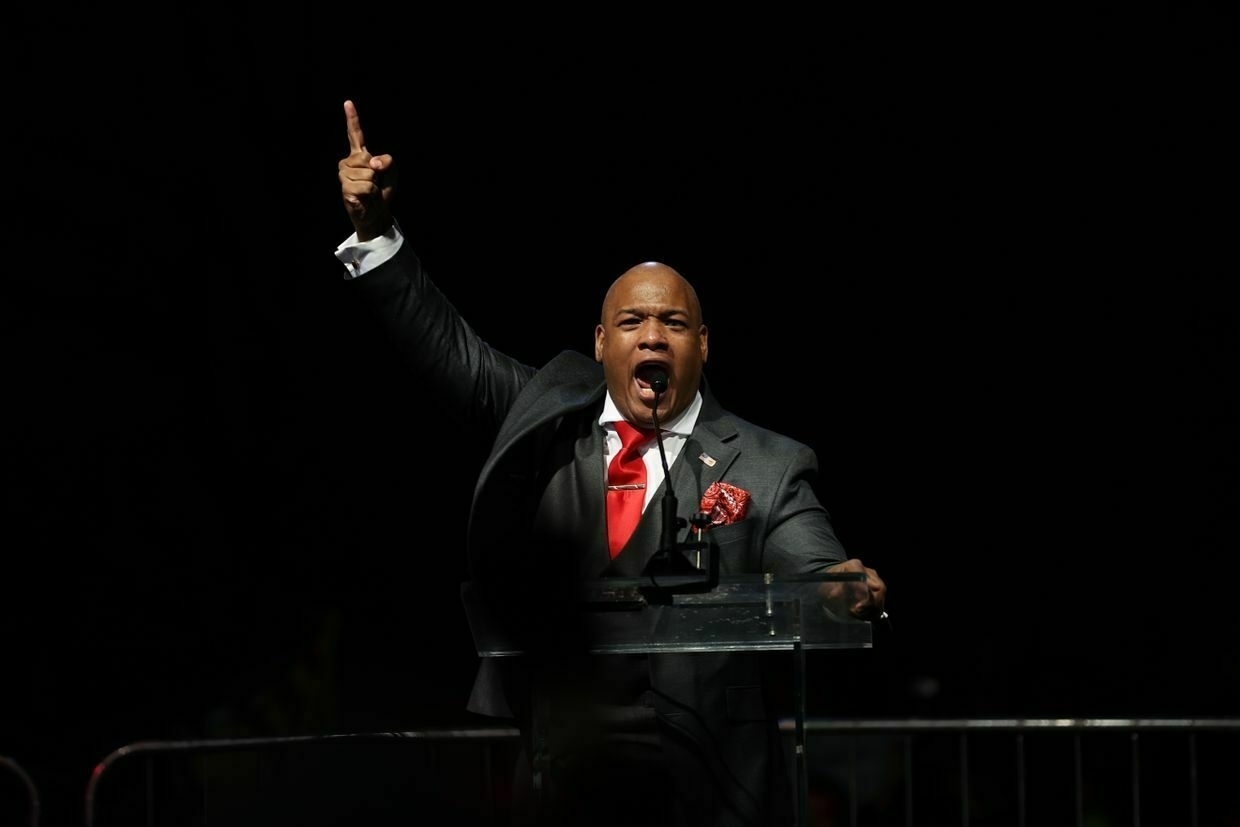
-
Ukrainian troops reportedly face issues with some German weapons
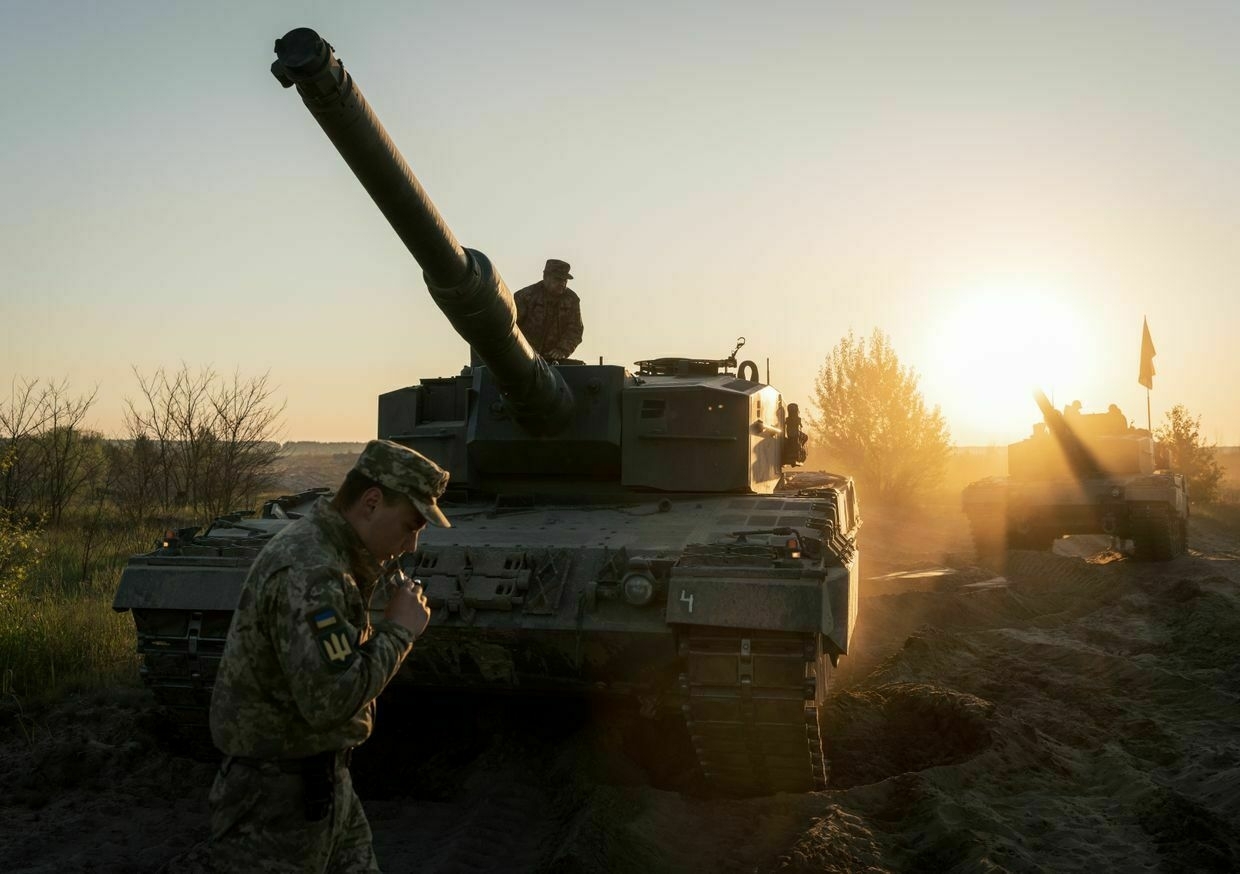
Ukrainian front-line units are struggling with several German-supplied weapons systems due to technical vulnerabilities, limited spare parts availability, and complicated maintenance, the newspaper Spiegel reported on April 10, citing internal German military documents.
The analysis references a January lecture in Delitzsch by the deputy military attache at the German Embassy in Kyiv, attended by around 200 junior Bundeswehr officers.
According to the transcript, while some German systems have earned praise in Ukraine, others have proven ill-suited for the rigors of high-intensity war.
The Panzerhaubitze 2000 self-propelled howitzer, described as “outstanding” in performance, was said to be so technically sensitive that its “suitability for combat is seriously questionable."
The Leopard 1A5, though labeled “reliable,” is reportedly deployed more as improvised artillery due to its inadequate armor. Meanwhile, the more advanced Leopard 2A6 often cannot be repaired on the front due to its costly maintenance and logistical demands.
Ukrainian forces have also faced constraints with air defense systems. The IRIS-T, while effective, suffers from limited availability and high ammunition costs.
The U.S.-made Patriot missile system, another critical component of Ukraine’s layered air defense supplied mainly by Germany, has reportedly struggled in the field due to aging MAN carrier vehicles, with spare parts increasingly hard to procure.
‘Putin is pure evil’ — Trump’s spiritual advisor on Russia’s war against UkraineWhen U.S. President Donald Trump paused military aid to Ukraine last month, the man described as his “spiritual advisor,” Pastor Mark Burns, backed the decision. This week, Burns is urging him to send Kyiv more tanks, fighter jets, and air defense. “I now believe that supporting Ukraine is AmericaThe Kyiv IndependentChris York
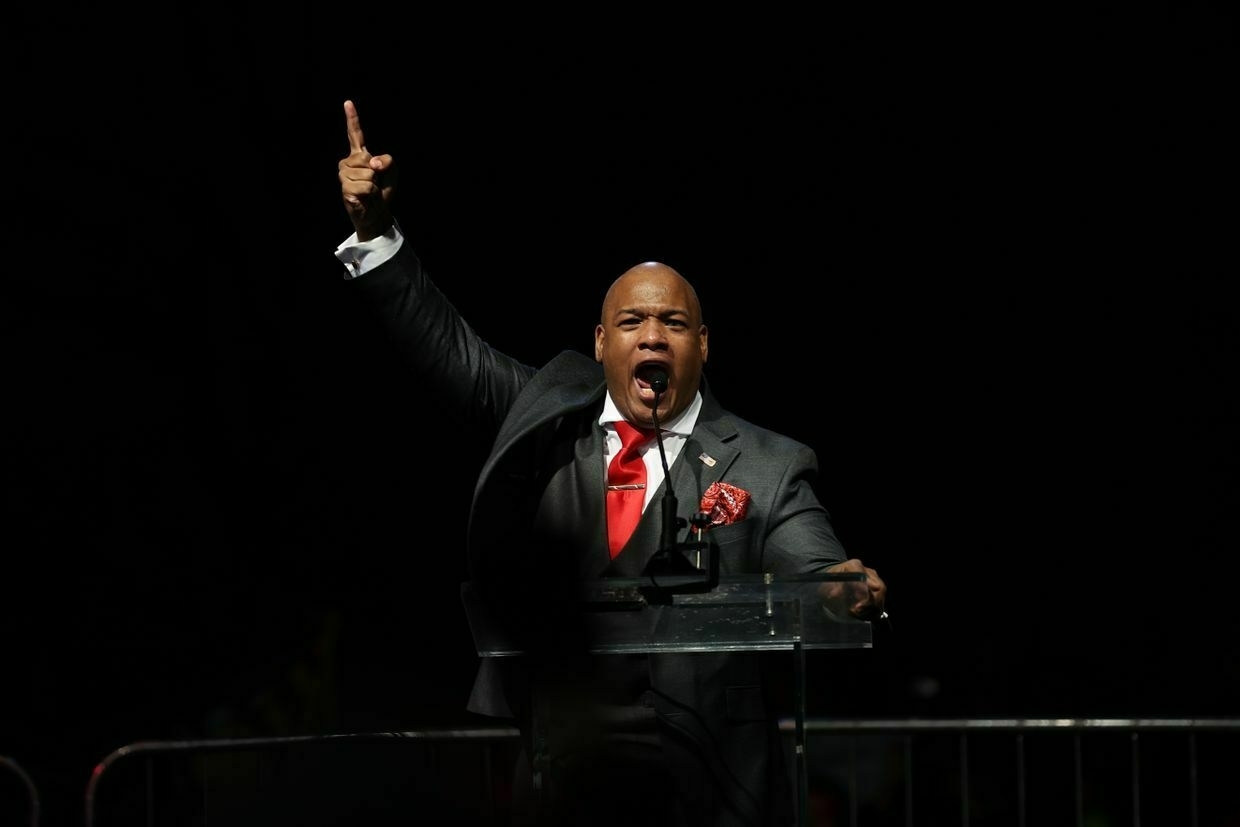
The Gepard anti-aircraft systems, however, stood out as the most successful German weapon deployed in Ukraine. Decommissioned before the war and reactivated or sourced from abroad, the system was described in the lecture as “the most popular, effective, and reliable” among Ukrainian troops.
Sources within the Bundeswehr acknowledged that the attache’s remarks reflect battlefield realities. German weapons, though often technically advanced, were deployed in Ukraine under extreme conditions that have accelerated wear and tear.
Rapid training provided to Ukrainian troops in Germany often left little time for in-depth technical instruction, compounding logistical challenges.
With repair centers far from the front and Ukraine’s infrastructure strained, field maintenance has become a serious obstacle. Despite these challenges, Germany remains Ukraine’s top military donor in Europe.
As U.S. President Donald Trump continues to advocate for reduced U.S. involvement in European security and explores restoring relations with Russia, Germany’s role is expected to expand further.
Germany’s incoming chancellor, Friedrich Merz, has already pledged to rearm the country and boost defense spending, including through a 500 billion euros ($544 billion) infrastructure fund to modernize the Bundeswehr.
Germany’s military rebirth is Europe’s best bet against PutinWhen Russian President Vladimir Putin launched his full-scale invasion of Ukraine in February 2022, he knew that he was upending Europe’s security order. But this was more of a tactical gambit than a calculated strategy, and he could not have predicted what would follow. Though U.S. President DonaldThe Kyiv IndependentShlomo Ben-Ami
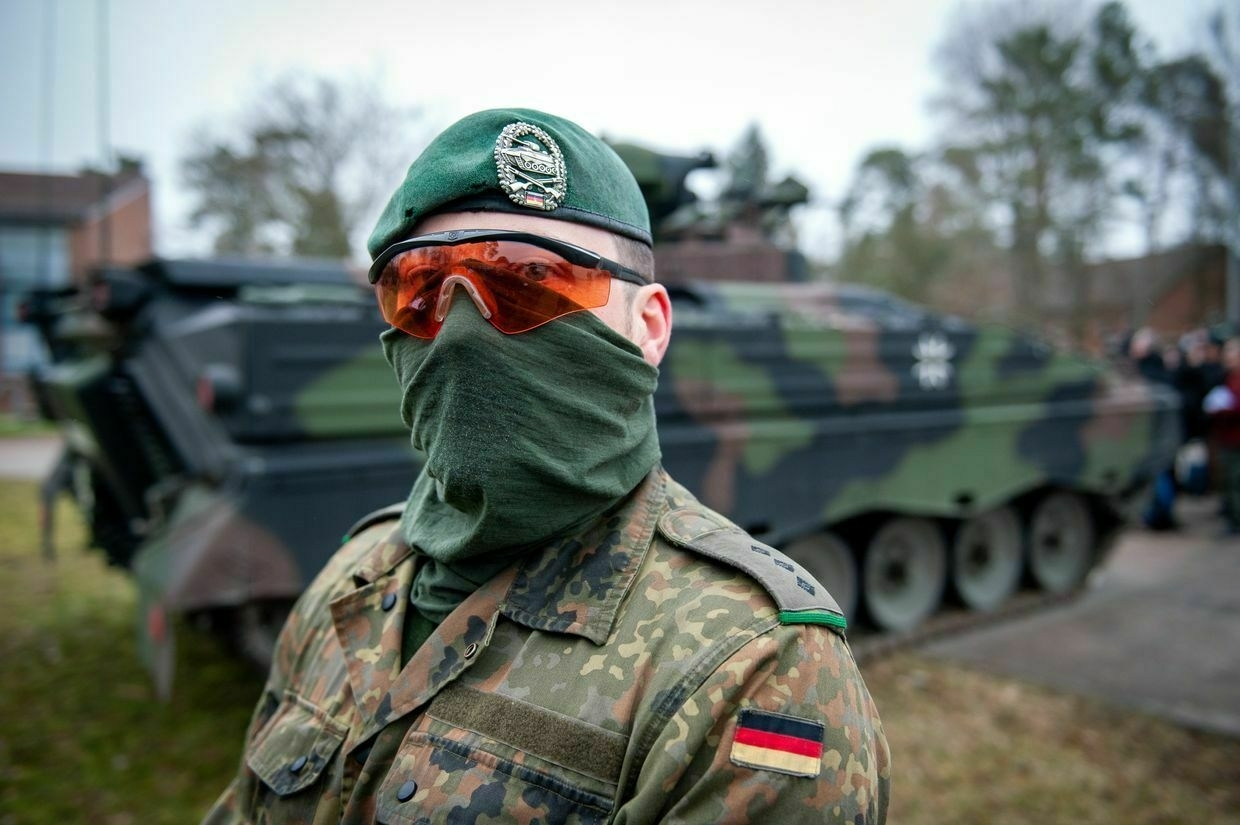
-
Trump's envoy Witkoff to meet Putin on April 11, Axios reports
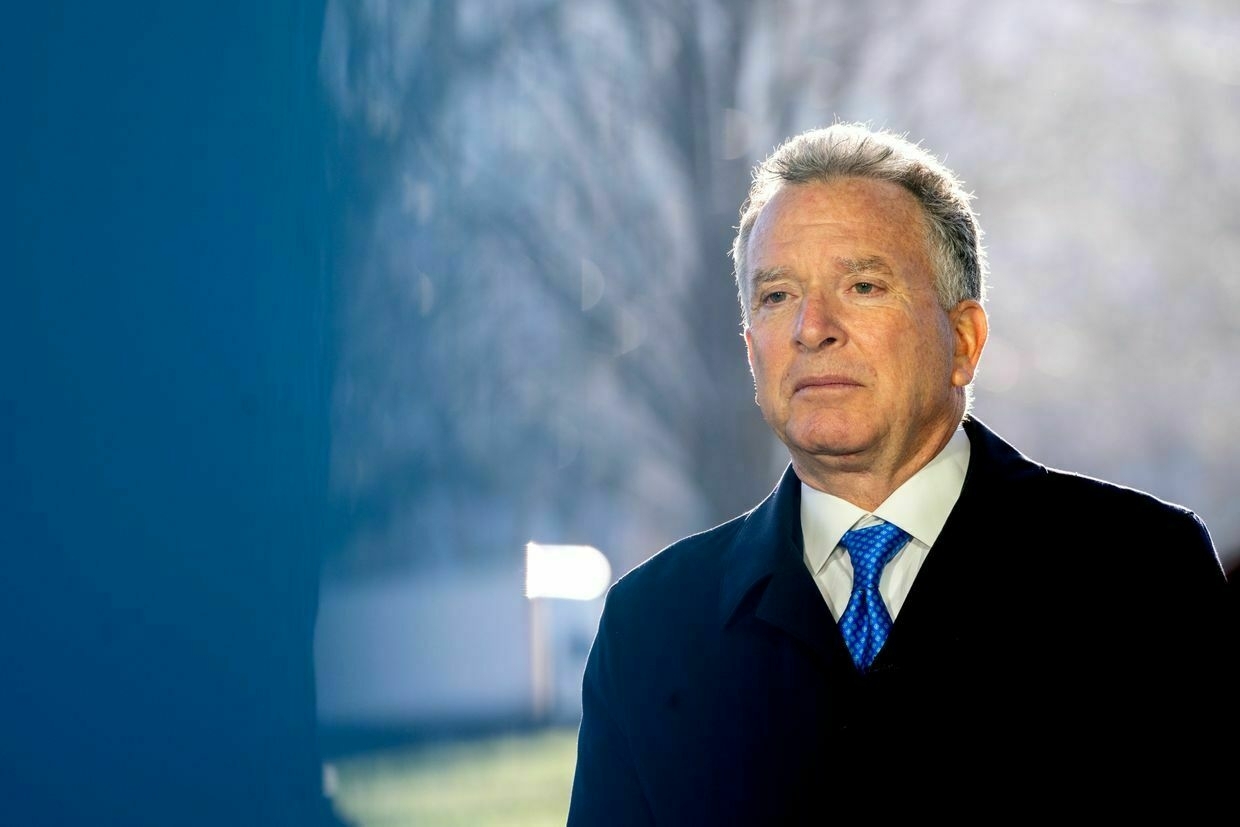
Steve Witkoff, U.S. President Donald Trump’s special envoy for the Middle East, traveled to Russia to meet Russian President Vladimir Putin on April 11, Axios reported, citing its source and FlightRadar data.
This would mark the third meeting between Putin and Witkoff, who has taken the lead in Trump’s efforts to broker a ceasefire between Russia and Ukraine.
The trip comes a week after Putin’s envoy, Kirill Dmitriev, met Witkoff and other U.S. officials in Washington and expressed “cautious optimism” about the renewed diplomatic engagement between the U.S. and Russia.
Trump’s push for a ceasefire has stalled as Moscow rejected a full 30-day truce backed by Washington and Kyiv and has repeatedly violated the energy ceasefire agreed upon on March 25.
These developments led to the U.S. president adopting increasingly harsh rhetoric toward Putin, saying he was “pissed off” and “very angry” at the Russian leader over his attacks on President Volodymyr Zelensky’s credibility and stalled peace talks.
The Trump administration has repeatedly threatened additional sanctions and tariffs against Russia unless it comes to the negotiating table and scales down attacks on Ukraine but is yet to take the step.
U.S. and Russian officials met in Istanbul on April 10 for the second round of talks about embassy operations, with Ukraine reportedly not being on the agenda. The same day, the two countries carried out a prisoner exchange, with Russia releasing U.S.-Russian national Ksenia Karelina in exchange for German-Russian citizen Artur Petrov.
The two sides also led two rounds of discussions on peace in Ukraine in Saudi Arabia.
Ukraine war latest: US ambassador to Ukraine to resignKey developments on April 10: * US ambassador to Ukraine to resign, State Department tells Kyiv Independent * ‘Before I got there, I had never held a weapon’ — Ukraine shows interrogation of Chinese POWs * Ukraine won’t accept any limits on its army in talks with Russia, official says * Russia…The Kyiv IndependentThe Kyiv Independent news desk
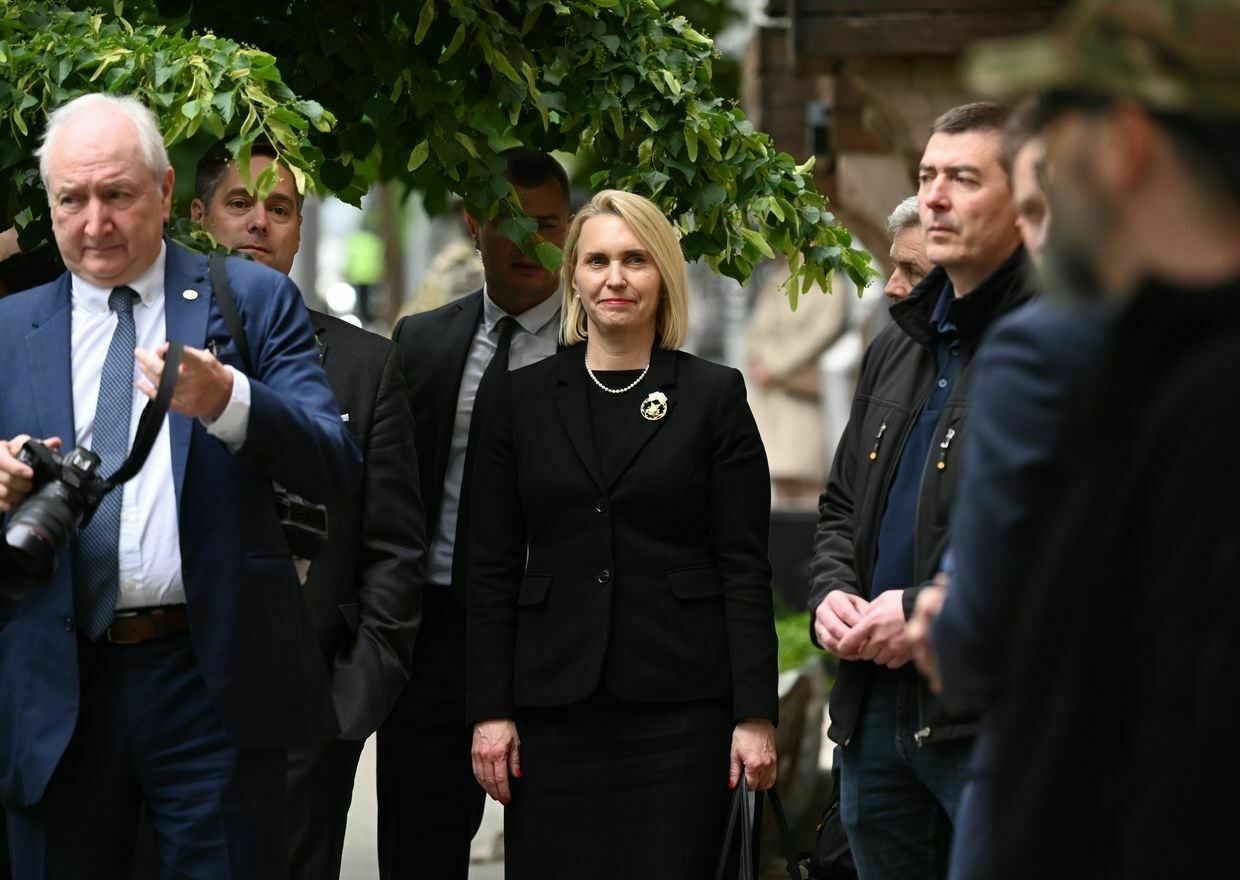
-
UK reportedly considers 5-year troop deployment to Ukraine to help rebuild army
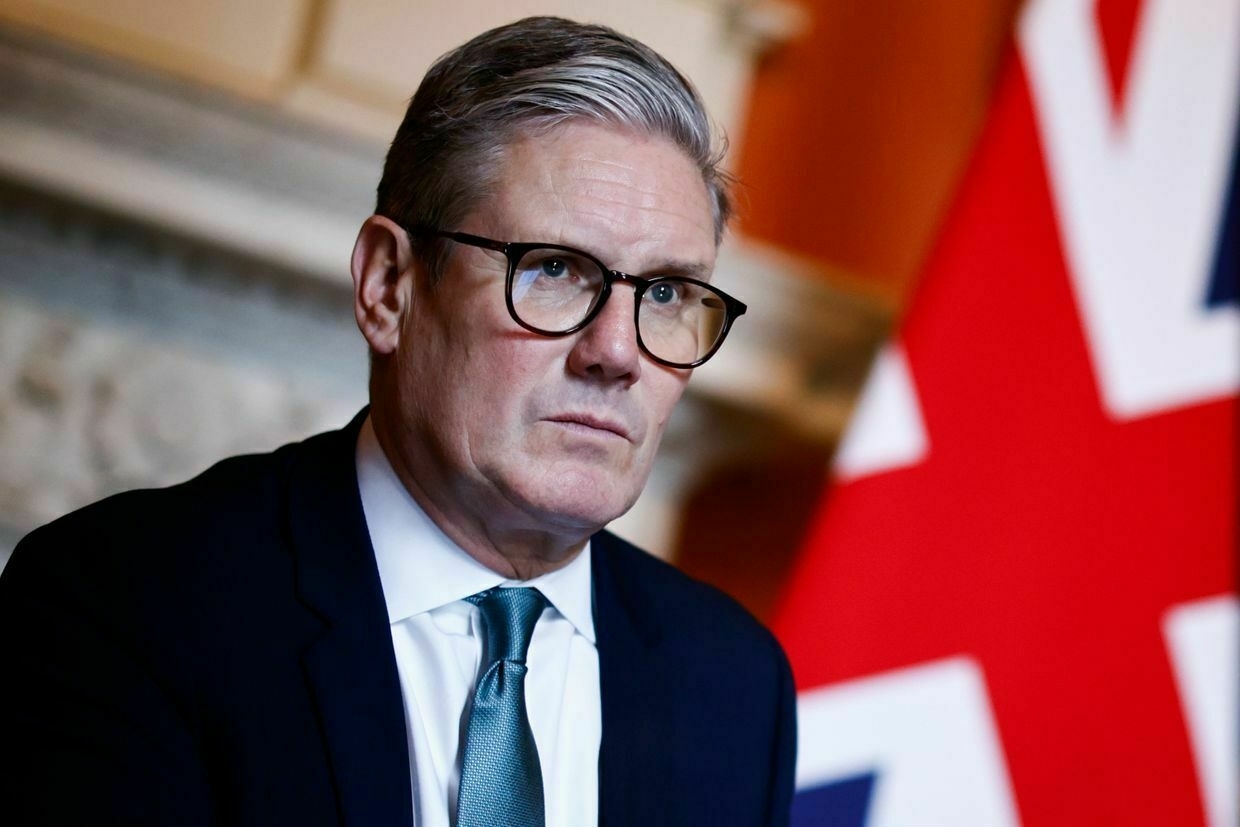
The U.K. is weighing plans to send British troops to Ukraine for up to five years as part of a broader European-led effort to rebuild Kyiv’s military, the Telegraph reported on April 10.
Military planners in London and Paris believe such a deployment could discourage Russian President Vladimir Putin from launching future offensives.
The proposal, developed within a multinational “coalition of the willing” led by the U.K. and France, would involve sending allied troops into Ukraine to help train its Armed Forces and stabilize the country after any potential ceasefire or peace settlement.
The initiative was first introduced by British Prime Minister Keir Starmer at a March 2 summit in London. The summit brought together leaders from several European countries and Canada to outline postwar military assistance for Ukraine.
At least 37 nations — including European, Commonwealth, and Asian countries — have joined the coalition discussions, with 15 reportedly prepared to commit troops.
The troop deployment plan foresees a phased withdrawal and will help with training Ukrainian forces. According to the Telegraph, it would also provide security assurances for Ukraine’s airspace and territorial waters.
Royal Air Force fighter jets may also be sent to reinforce Ukraine’s defenses as part of the proposed security guarantees.
French officials reportedly believe Russia is unlikely to attack Western forces stationed in Ukraine, given the Russian military’s difficulty securing even modest gains on the battlefield.
While London and Paris have lobbied Washington to support the plan with airpower, intelligence, or surveillance capabilities, the Trump administration has yet to offer any commitments and has ruled out deploying ground troops.
U.S. President Donald Trump has also not offered any security guarantees to Ukraine and is reportedly preparing to scale back the U.S. military presence in Europe.
Without U.S. backing, the European reassurance force faces questions over its long-term viability. U.K. officials maintain that American participation remains critical.
Trump claimed on Feb. 24 that Putin would accept the presence of European peacekeepers in Ukraine as part of a settlement, though Russian Foreign Minister Sergey Lavrov dismissed the suggestion.
Kremlin officials have repeatedly said that any foreign troop presence in Ukraine would be treated as direct involvement in the conflict.
‘Putin is pure evil’ — Trump’s spiritual advisor on Russia’s war against UkraineWhen U.S. President Donald Trump paused military aid to Ukraine last month, the man described as his “spiritual advisor,” Pastor Mark Burns, backed the decision. This week, Burns is urging him to send Kyiv more tanks, fighter jets, and air defense. “I now believe that supporting Ukraine is AmericaThe Kyiv IndependentChris York
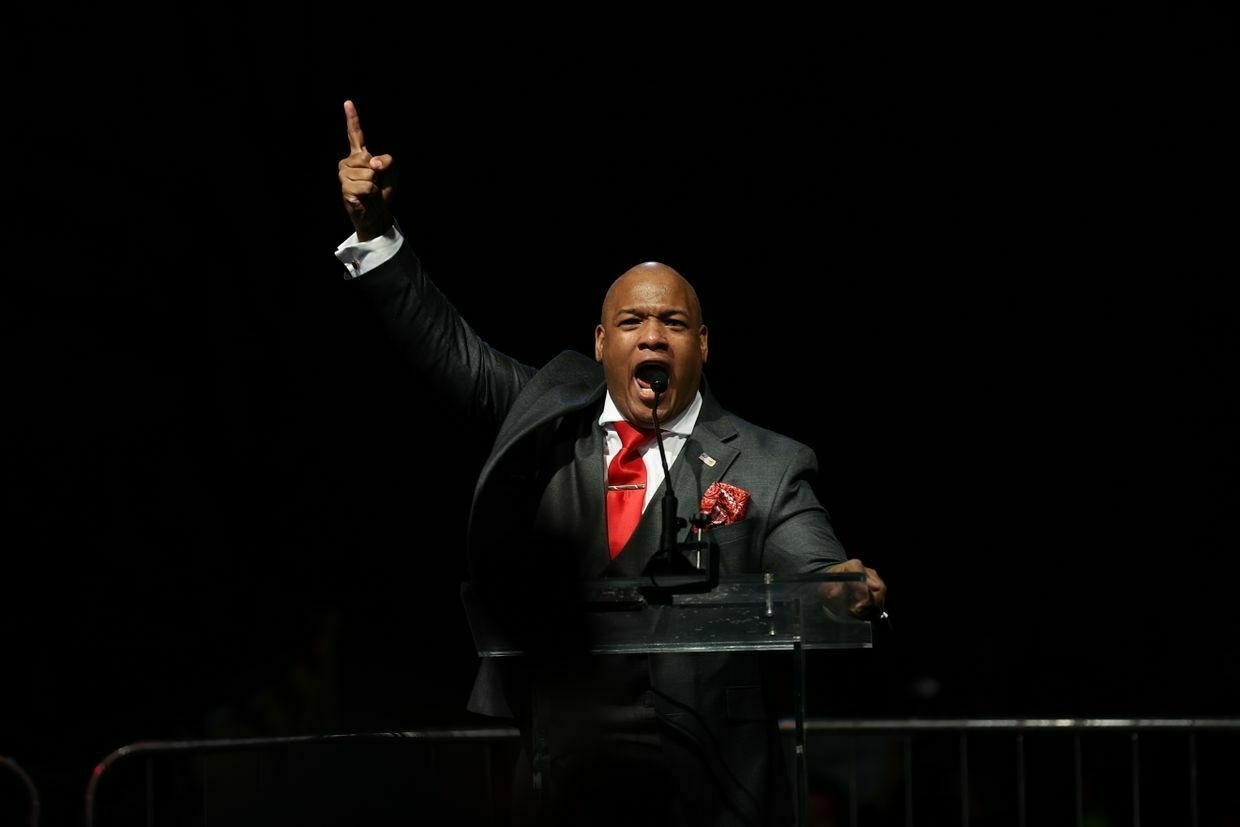
-
'Nothing else can be discussed' about Russia, Ukraine until 'the killing stops,' US State Department says
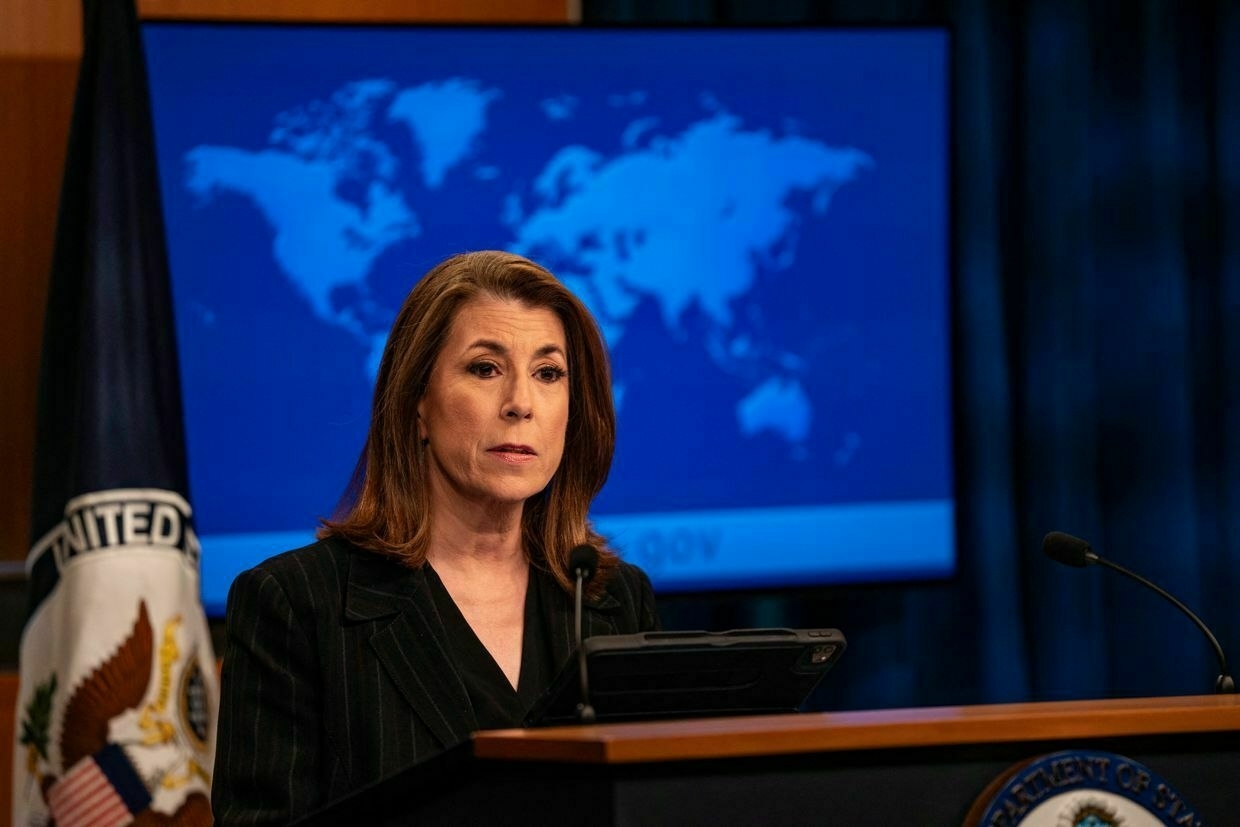
A ceasefire that would put a stop to the “meatgrinder” in Ukraine is the key condition for any future discussions on the Russia-Ukraine war, U.S. State Department spokesperson Tammy Bruce told journalists on April 10.
“It is a dynamic that will not be solved militarily. It is a meat grinder,” Bruce said at a press briefing.
“There is nothing else (that) can be discussed for the outcome until the shooting and the killing stops."
The comments came the same day as U.S. and Russian delegates met in Istanbul to discuss embassy operations in a meeting the State Department described as “constructive.”
Also on April 10, the two countries carried out a prisoner exchange, with Russia releasing U.S.-Russian national Ksenia Karelina in exchange for German-Russian citizen Artur Petrov.
U.S. President Donald Trump’s effort to broker a ceasefire in Ukraine has been accompanied by the resumption of direct diplomatic contact with Moscow after years of isolation imposed by his predecessor, ex-President Joe Biden.
Officials on both sides have also discussed venues for economic cooperation, with the Russian side calling for sanctions relief as part of the ceasefire talks.
Though Trump has repeatedly boasted about his warm relationship with Russian President Vladimir Putin, he seems to be growing frustrated with the Kremlin’s chief as his attempts to negotiate a truce stall.
Moscow rejected a full 30-day truce agreed upon by Kyiv and Washington on March 11 and repeatedly violated the pause on strikes against energy infrastructure penned on March 25.
The Kremlin claims it had adhered to the partial truce and, in turn, accused Ukraine of the same violations.
U.S. Secretary of State Marco Rubio implied last week that the U.S.’s patience with Russia may be running out, noting that Trump would not engage in “endless negotiations about negotiations."
“We will know soon enough, in a matter of weeks, not months, whether Russia is serious about peace or not. I hope they are,” Rubio said.
Bruce commented that Russia “needs to take (Rubio’s statement) seriously."
“But this is not going to go on for six months or a year or anything else. And the president has also made it clear we want diplomacy, but the fact is is that we’re watching and judging as this process continues,” she added.
The Trump administration has repeatedly threatened additional sanctions and tariffs against Russia unless it comes to the negotiating table and scales down attacks on Ukraine but is yet to take the step.
While exerting little pressure on Russia, Trump has taken a tougher stance on Ukraine, briefly pausing all military and intelligence support in March after publicly berating President Volodymyr Zelensky in the Oval Office.
Ukraine war latest: US ambassador to Ukraine to resignKey developments on April 10: * US ambassador to Ukraine to resign, State Department tells Kyiv Independent * ‘Before I got there, I had never held a weapon’ — Ukraine shows interrogation of Chinese POWs * Ukraine won’t accept any limits on its army in talks with Russia, official says * Russia…The Kyiv IndependentThe Kyiv Independent news desk
